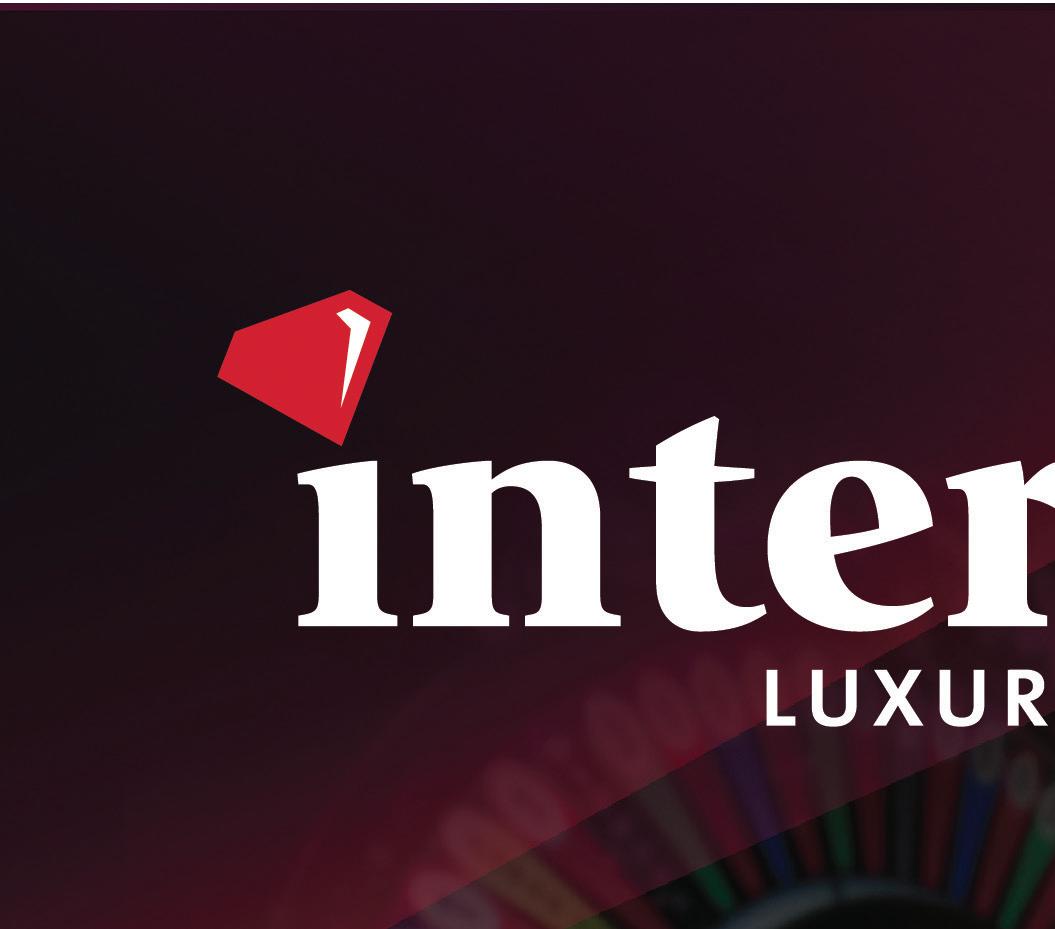


























































COO, EDITOR IN CHIEF
Julian Perry
EDITOR
Tim Poole
Tim.Poole@gamblinginsider.com
STAFF WRITER
Matthew Nicholson
Matthew.Nicholson@gamblinginsider.com
JUNIOR STAFF WRITER
Lucy Wynne
Lucy.Wynne@gamblinginsider.com
LEAD DESIGNER
Olesya Adamska
DESIGNER
Christian Quiling
DESIGN ASSISTANTS
Svetlana Stoyanova, Gabriela Baleva
MARKETING & EVENTS MANAGER
As Las Vegas gears up for not just one but two big gaming-related events (G2E in October and its very own Formula 1 Grand Prix in November), let's not forget that gaming in the US has plenty to offer outside Nevada.
Indeed, with properties like MGM National Harbor, Foxwoods Resort Casino, Encore Boston Harbor and many more displaying the very best of regional gaming, the main focus of this issue looks east of Nevada: to New Jersey and Pennsylvania.
Reporting the monthly numbers for both states at Gambling Insider has almost become an exercise in 'spot the di erence' during 2023, as the two states vie for what are e ectively local bragging rights. As our Facing Facts section shows, the two states have both had individual months to savour this year, with a betting person perhaps not able to call which state will post the higher revenue for any given month. In our cover feature, we assess both states and their pursuit of greatness, speaking to operators, suppliers and consultants to nd out more about the workings within.
Elsewhere in this edition, we hear from regular contributor Paul Sculpher (twice) on various issues affecting the UK market – not least the Gambling Act White Paper. Regular contributor Ranjana Adhikari and her team at IndusLaw also return with an update on the Indian market. A newcomer to our list of contributing guests is Daniela Guerreiro, who goes into impressive detail on the AML issues currently facing Macau.
Away from our guest editorials (a list that also includes John Connelly, E. Sequoyah Simermeyer, Miles Baron and more), we preview the 10th Global Gaming Awards Las Vegas ceremony. Looking back on the Awards since their inception in 2014 (and the birth of the London event in 2018, as well as the Asia-Paci c event in 2022), we highlight some of the major dates – and victories – that helped make this Awards journey so special along the way.

So to all readers, we hope you enjoy this issue as always – and to those attending G2E, we'll see you there!
TP, Editor
Mariya Savova
PRODUCTION CONTROLLER
Oleksandra Myronova
IT MANAGER
Tom Powling
COMMERCIAL DIRECTOR
Deepak Malkani
Deepak.Malkani@gamblinginsider.com
Tel: +44 (0)20 7729 6279
SENIOR ACCOUNT MANAGER
Michael Juqula
Michael.Juqula@gamblinginsider.com
Tel: +44 (0)20 3487 0498
SENIOR BUSINESS DEVELOPMENT MANAGER - U.S.
Aaron Harvey
Aaron.Harvey@playerspublishing.com

Tel: +1 702 425 7818
ADVERTISING SALES EXECUTIVE - U.S.
Ariel Greenberg
Ariel.Greenberg@playerspublishing.com
Tel: +1.702 833 9581
Tracy Robbison
Tracy.Robbison@playerspublishing.com
Tel: +1 702 485 3377
ACCOUNT MANAGERS
William Aderele
William.Aderele@gamblinginsider.com
Tel: +44 (0)20 7739 2062
Irina Litvinova
Irina.Litvinova@gamblinginsider.com
Tel: +44 207 613 5863
Serena Kwong
Serena.kwong@gamblinginsider.com
Tel: +44 (0)20 3435 5628
ACCOUNT EXECUTIVE Samuel Sud


Samuel.Sud@gamblingInsider.com
Tel: +44 (0)207 729 0643
CREDIT MANAGER Rachel Voit

WITH THANKS TO:
Diane Spiers, Kevin Cunningham, Jody Madigan, Stephen Crystal and Jacob Claesson, Miles Baron, Paul Sculpher, Daniela Guerreiro, Ranjana Adhikari, Ivan Kravchuk, E. Sequoyah Simermeyer, Gilad Naim, Stian Enger Pettersen, Artyom Ustinov, Margarita Cruz, Paul Kavanagh, Ryszard Presch, Dima Reiderman, Irina Cornides, Shaun Zammitt and John Connelly, Advantech, FBM, Inspired, Interblock & Novomatic
Gambling Insider magazine ISSN 2043-9466 Produced and published by Players Publishing Ltd
 Julian Perry, COO, Editor-in-Chief
DIANE SPIERS
VP Marketing and PR, Bally's
JODY MADIGAN COO, Mohegan
Tim Poole, Editor
Julian Perry, COO, Editor-in-Chief
DIANE SPIERS
VP Marketing and PR, Bally's
JODY MADIGAN COO, Mohegan
Tim Poole, Editor






















10

22 Pursuing greatness Gamb ling Insider explore two of the US's biggest gaming states in New Jersey and Pennsylvania and asks the question: which will become the more dominant market going forward
32 A Sisyphean task








Regular Gambling Insider columnist Paul Sculpher returns for our September/ October issue to discuss the UK White Paper and the process of legislation it must now undertake




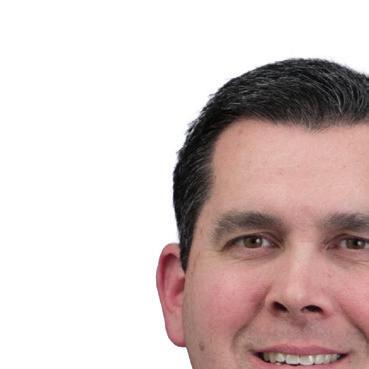
34 In the department we trust Sculpher is in action for his second column of our September/October issue, speaking with Michael Byrne from the Department of Trust about the issue of affordability
38 ‘Dirty laundry’
30 “The full 90 minutes” Miles Baron, CEO of the Bingo Association, speaks to Gambling Insider Editor Tim Poole about the impact of the White Paper on the UK land-based bingo sector
Daniela Guerreiro, Associate at MdME, discusses the prevention of money laundering in Macau casinos





40 New rules
Regular Gambling Insider contributors from IndusLaw, Ranjana Adhikari, Shashi Shekhar Misra & Ruhi Kanakia, discuss the latest from the Indian gambling market


























In keeping with our cover theme, Gambling Insider compares statistics from New Jersey and Pennsylvania from January to July 2023 – and July alone in more detail – as the neighbouring states tussle to outperform one another
New Jersey vs Pennsylvania total gaming revenue ($M) January – July 2023
Sources: New Jersey Division of Gaming Enforcement, Pennsylvania Gaming Control Board
• As we can see from out first graph, Pennsylvania generated greater gaming revenue than New Jersey in five out of seven months through January to July. In fact, it outperformed New Jersey for the first five months of 2023, although New Jersey amassed greater revenue for June and then significantly more for July.
• The highest individual monthly total came in March, when Pennsylvania saw $515.3m in total gaming revenue. New Jersey’s highest total was July’s, at $506.2m.
New Jersey vs Pennsylvania sports betting & iGaming ($M) July 2023
Sources: New Jersey Division of Gaming Enforcement, Pennsylvania Gaming Control Board
• Taking the most recent available results at press time, New Jersey comprehensively outperformed Pennsylvania when it came to sports and online casino. Its sports betting revenue was almost double that of Pennsylvania’s, from sports betting handle (total bets/turnover) of almost twice as much, too.
• For online casino (iGaming), New Jersey also edged Pennsylvania out for July by over $20m in revenue.
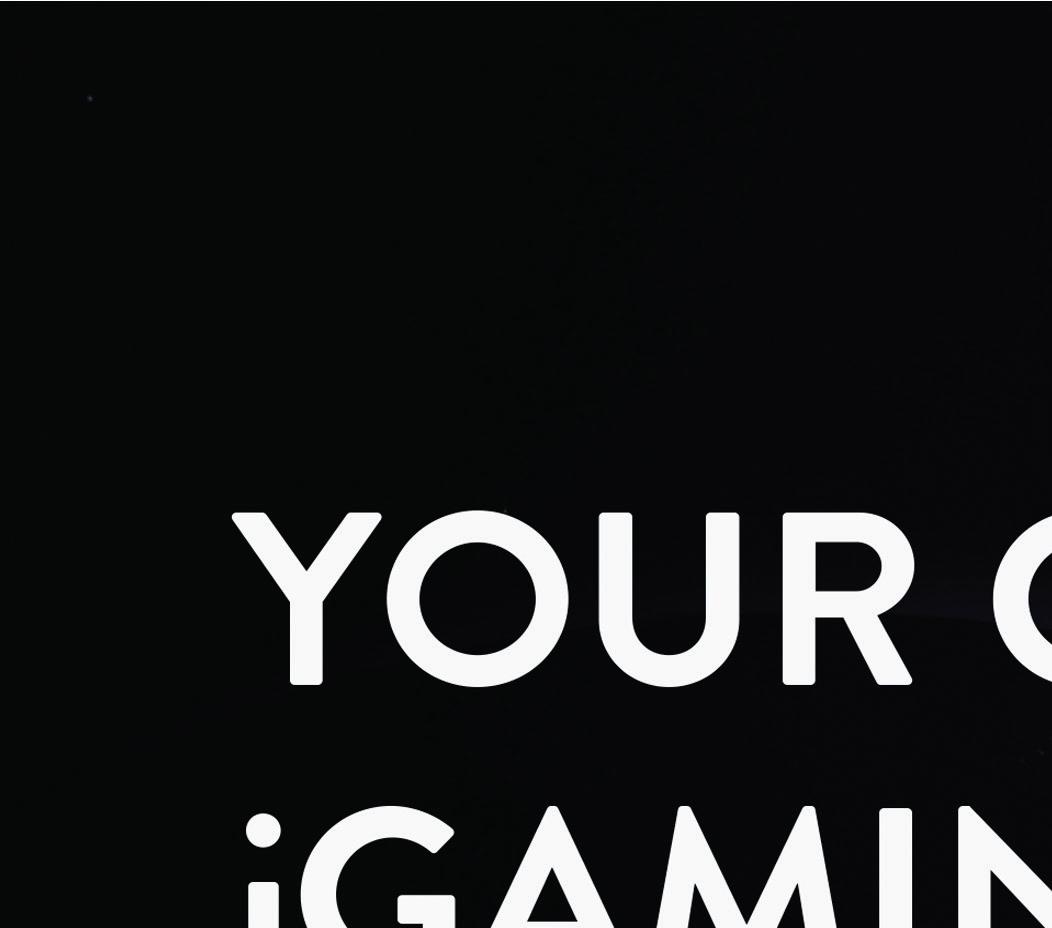



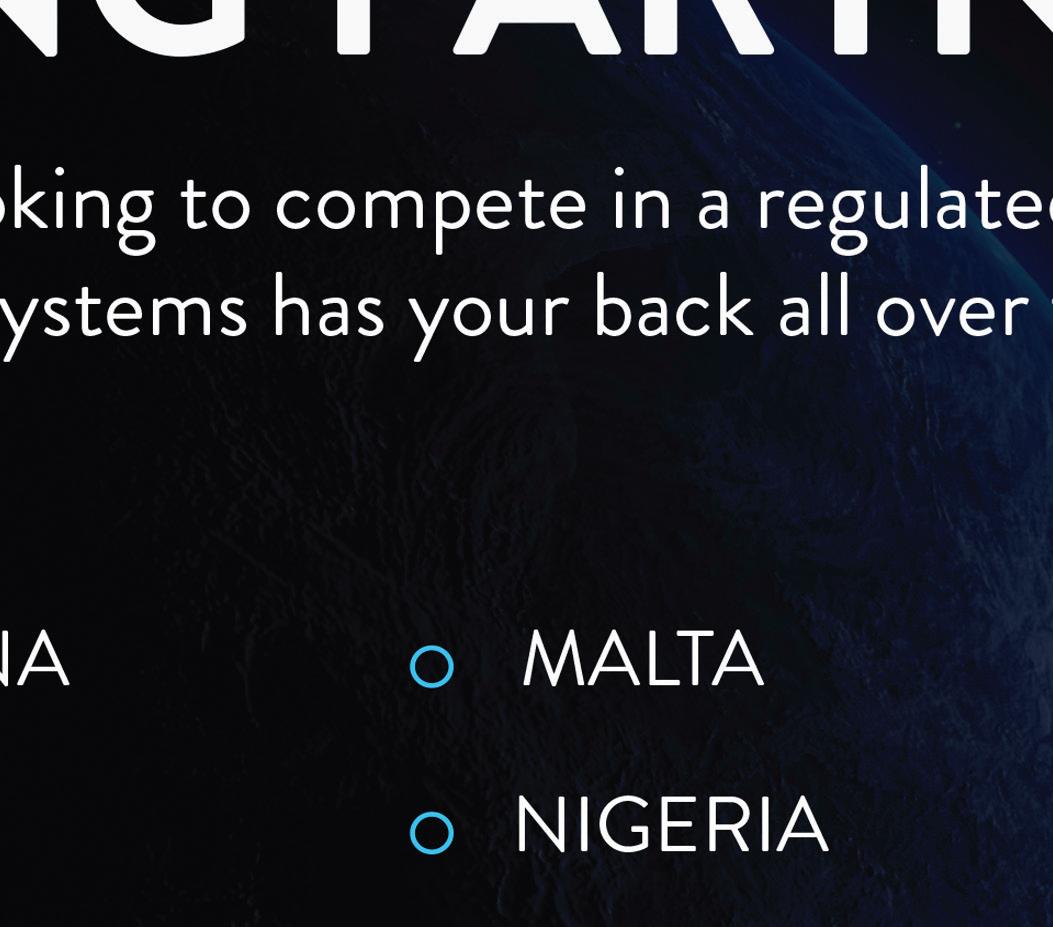

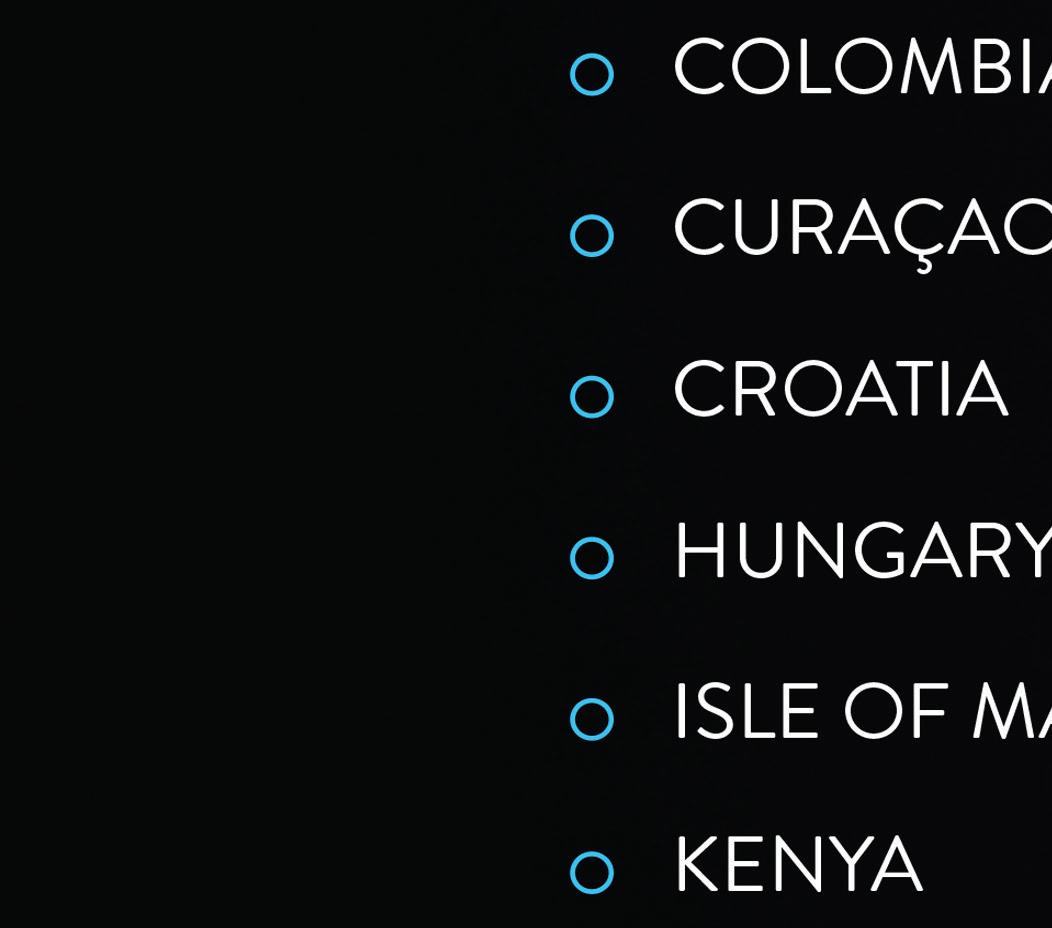




Sources: New Jersey Division of Gaming Enforcement, Pennsylvania Gaming Control Board
• Our third graph compares monthly growth for the same period (January to July) in both New Jersey and Pennsylvania. For every month during the period, each state saw growth, although this was strongest in January, when New Jersey’s gaming revenue rose 15% year-on-year – and Pennsylvania’s 18%.
• Growth steadied as the first half of 2023 progressed, with Pennsylvania only seeing a 3% rise in April and, despite having its best month of the year in terms of revenue, New Jersey only enjoying 5% growth. Still, New Jersey saw double-digit growth in five out of a possible seven months; Pennsylvania saw double-digit growth four times.
Sources: New Jersey Division of Gaming Enforcement, Pennsylvania Gaming Control Board
• Outside of sports and online casino, it’s interesting to note Pennsylvania was the stronger performer in terms of legacy retail verticals. New Jersey did generate a higher amount of slot machine revenue for July – but only just.
• Pennsylvania’s table games made over $10m more than New Jersey’s, however, ensuring its landbased casino revenue total for July surpassed that of the Garden State. That is a particularly notable statistic given New Jersey was so much higher in overall monthly gaming revenue July.




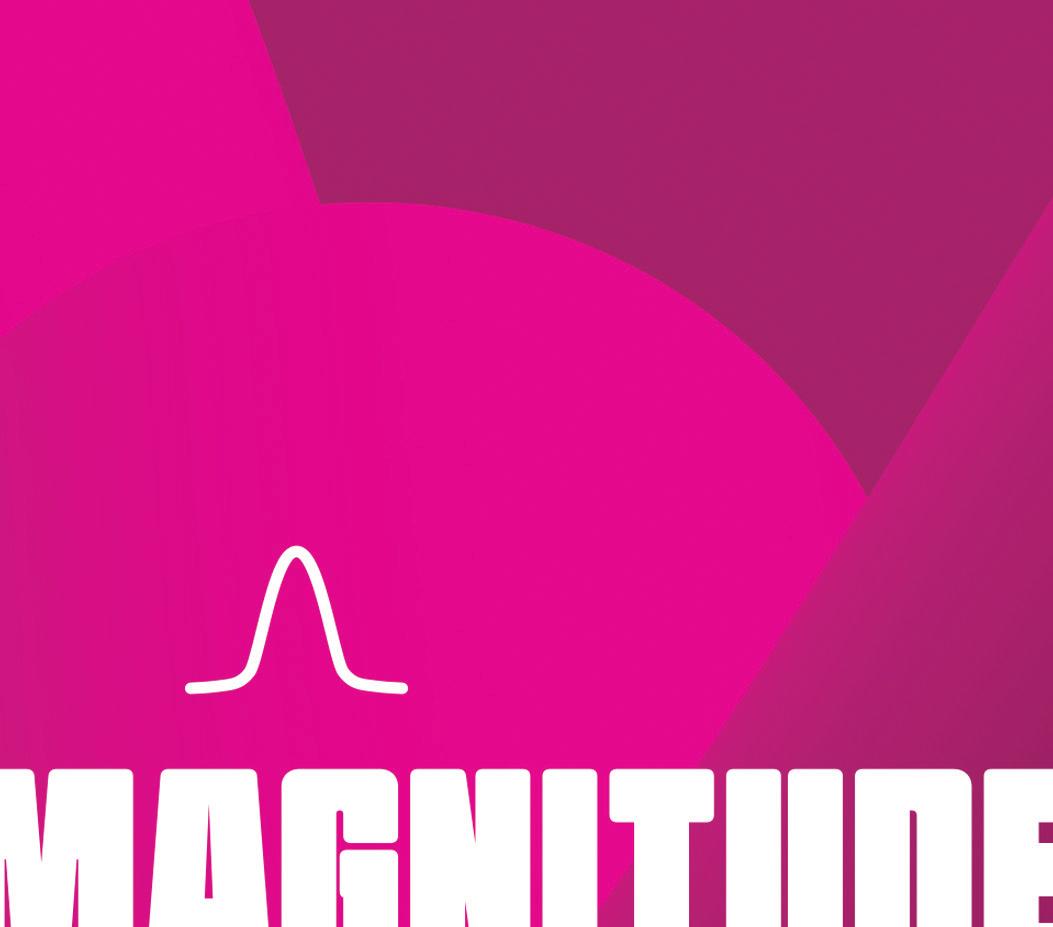






Sources: New Jersey Division of Gaming Enforcement, Pennsylvania Gaming Control Board
• When broken down by operator, New Jersey’s July revenue was once again dominated by MGM Resorts’ Borgata, which brought in $127.6m in total gaming revenue (up 3% year-on-year).
• Other performers to stand out included Hard Rock Hotel & Casino Atlantic City (revenue: $62.8m), Resorts Digital (revenue: $59.5m) and Golden Nugget (revenue: $54m).
Hollywood Casino York - 8
Hollywood Casino Morgantown - 7.1
Video gaming terminals - 3.4
Parx Shippensburg - 2.7
Lady Luck Casino Nemacolin - 2.1
Bally's Pennsylvania - 1.4
Fantasy contests - 0.7
Sources: New Jersey Division of Gaming Enforcement, Pennsylvania Gaming Control Board
• Compared to New Jersey, Pennsylvania has far more operators that have contributed to its overall total, all with a smaller split.
• Hollywood Casino at Penn National Race Course generated the highest monthly total, at $70.1m, while the likes of Park Casino, Galley Forge Casino Resort and Wind Creek Bethlehem followed closely behind in the $50-57m region. Video gaming terminals and fantasy contests also produced just over $4m in revenue between them.
Pennsylvania total gaming revenue broken down by operator/segment ($M) July 2023











Gambling Insider tracks operator prices for companies who operate in New Jersey and/or Pennsylvania, tallying with this issue’s main cover theme. Stock prices are taken across a six-month period (March 2023 to August 2023) – and from the close of the first available date of the month
New Jersey/Pennsylvania operators with market capitalisation of $10bn or greater
• Six-month high - August ($57.69) • Six-month low - June ($41.66)
• Market capitalisation - $12.43bn (As of 1 August)
• Six-month high - August ($50.08)
• Six-month low - June ($39.12)
• Market capitalisation - $18.23bn (As of 1 August)
• Six-month high - May (£157.90)
• Six-month low - March (£134.90)
• Market capitalisation - £35.72bn (As of 1 August)
• Six-month high - August ($31.58)
• Six-month low - March ($18.32)
• Market capitalisation - $34.57bn (As of 1 August)











• Six-month high - March ($20.35)
• Six-month low - June ($14.13)
• Market capitalisation - $740.2m (As of 1 August)
• Six-month high - March ($4.26)
• Six-month low - June ($3.02)
• Market capitalisation - $841.69m (As of 1 August)
• Six-month high - June (SEK 126.45)
• Six-month low - April (SEK 111.15)
• Market capitalisation - SEK2.72bn (As of 1 August)
• Six-month high - May ($149.08)
• Six-month low - August ($116.86)
• Market capitalisation - $8.76bn (As of 1 August)





































As the 10-year anniversary of the Global Gaming Awards approaches, Gambling Insider takes a look at some of the highlights the last decade has thrown up








MGM wins three Global Gaming Awards in Las Vegas, including Land-Based Operator of the year (for the second year running). Meanwhile, Scientific Games wins Land-Based Industry Supplier of the year










Wynn Resorts takes MGM’s crown and wins the Land-Based Operator of the year Award. Sportradar takes home Responsible Business of the year










The debut Global Gaming Awards ceremony in London takes place at The Hippodrome, with bet365 winning Online Sports Betting Operator of the year





In Las Vegas, Interblock's Stadium wins Land-based Product of the year Award, while DraftKings wins Digital Operator of the year





10 YEARS OF WINNERS

FEATURES


At the second Asia-Pacific Global Gaming Awards, Marina Bay Sands wins Integrated Casino of the year, while BetConstruct wins Digital Supplier of the year














































At the Global Gaming Awards London, Evolution wins Online Casino Supplier of the year, with Paf winning the Corporate Responsibility Programme of the year Award














Outside of Nevada, Pennsylvania and New Jersey are two of the strongest hubs within US gaming. Gambling Insider explores both neighbouring markets, the remarkably similar numbers they have been posting and what the


Two markets, two states, two different ways of making vast sums of gross gaming revenue (GGR) – yet markets that are seeing phenomenal success compared to the rest of the US (outside of Las Vegas, of course).
Pennsylvania’s journey with casinos and gambling began with Act 71, which passed in 2004 and established the Pennsylvania Gaming Control Board – allowing racetracks to be legalised for the first time in modern US history.
the huge figures reported by Pennsylvania every quarter are comparable to anywhere in the US behind the ancestral hub of US gambling, Nevada.
Over the course of the next 20 years,







Over the course of the next 20 years, the state saw casinos come into being, while online betting was signed into law in 2017 and sports betting legalised in May 2019. To say that the state took to gambling as a duck does to water may not be a stretch, as
But, of course, Pennsylvania doesn't have to look far for a competitor. Indeed, it is geographically placed right next to another US gambling hub: New Jersey, the home of Atlantic City. In its time, New Jersey has seen many casinos come and go – with stars such as Frank Sinatra and Sam Cooke playing the gambling halls across the decades. Sinatra even allegedly once grabbed Donald Trump by the tie over a disputed contract at the Taj Mahal Atlantic steeped in rich history.
City. So, New Jersey’s gambling history is

New Jersey and Pennsylvania both have land-based casinos, online sports betting and online casino – and have been live for a number of years – making them a very useful case study in the typical US gaming market that has access to all the major verticals. Bucking the historical trend, in recent times, Pennsylvania has been slightly outperforming New Jersey in terms of revenue but figures vary month to month in an intriguing tussle of GGR. So, Gambling Insider looks into how the two states are performing, how they got to where they are today – and where their next sources of growth lie.

Speaking to Gambling Insider about the trends seen in players across both states, Diane Spiers, VP of Marketing & Public Relations at operator Bally’s, highlighted the changes seen since the Covid-19 pandemic, as normality is resumed for land-based gambling. She said: “As the gaming industry returns to normalcy, gaming and non-gaming experiences are being reintroduced to the market, as well as many new offerings aimed at appealing to shifting player trends and tastes. Today’s players are seeking new and exciting experiences that offer more opportunities to win, including new high-tech slot machines, tableside bets and progressives for slot machines and tables.”
Meanwhile, Kambi’s Head of Commercial Pre-Sales, Kevin Cunningham, also commented on both states’ attitude towards sports betting and how New Jersey’s stake size has grown significantly larger than Pennsylvania’s in the last year. He explained: “On a player behaviour level, one of the biggest surprises we have seen
on the Kambi network is that the average stake size in New Jersey in the last 12 months is approximately twice that of what we have seen in Pennsylvania. We’ve also seen more live betting turnover in New Jersey than we have in Pennsylvania, with live accounting for 44% of New Jersey’s turnover in the last year compared to 34% in Pennsylvania.”
Cunningham’s comments are no surprise to anybody that looks at the monthly sports betting figures for both states, as New Jersey’s sports betting market dwarfs that of Pennsylvania. For July 2023, sports betting handle in New Jersey totalled $587m, while Pennsylvania posted $338.5m. What this indicates is that players in New Jersey are significantly more committed to the market than those in Pennsylvania. Cunningham also stated that he believes New Jersey is likely to stay ahead of Pennsylvania: “Despite the proximity, there are a few key nuances as to why New Jersey will likely stay ahead of Pennsylvania. The first is that online sports betting in New Jersey launched nearly a full year before Pennsylvania and they benefit from having more operators for bettors to choose from. New Jersey offers customers 22 online sportsbooks compared to 12 in Pennsylvania.”


He further added: “Pennsylvania’s growth story continues to push forward. Over the last 12 months, Pennsylvania has grown at a higher rate than New Jersey in revenue. With a population of nearly four million more people, there is greater growth upside for the state, but New Jersey’s propensity to wager still appears to be amongst the strongest in the US.”
When it comes to both markets, one of the biggest increases is found in the iGaming vertical. After the pandemic ravaged the land-based casino market, players had to find other ways to play their favourite casino games – and the internet provided the perfect solution to such a problem. However, now that the pandemic is over and casinos are once again welcoming visitors, some are struggling to see the in-person footfall that was seen before Covid.
That said, the extent of the impact this is having on land-based casinos is disputed by Jody Madigan, Mohegan’s COO. He argues that whilst iGaming is growing, it doesn't signal the death of the casino floor. “The impact on retail gaming in the markets we operate or manage is minimal. IGaming and online sports betting are still relatively new, but they have added more excitement and promotional opportunities for players.”

Madigan continued: “While they are convenient and enjoyable, they lack the atmosphere, thrill and social experience that comes with visiting a resort casino. Therefore, many guests still enjoy both iGaming and casino experiences. This trend is likely to continue, especially with the integration of online and retail rewards programs.”

It appears that those who work within the land-based casino market do not see why iGaming and retail can’t work hand in hand, rather than being fierce rivals. Of course, common sense would say iGaming will have a long-term impact on casinos, though casinos themselves will never become obsolete due to the communal nature and destination excitement that can only be felt in property.

SCCG Co-Founder and CEO, Stephen














Crystal, also comments on the impact iGaming is having on casinos, as he told Gambling Insider: “The effect this is having on places such as Atlantic City – the hub of New Jersey’s casino industry – is causing many operators to invest heavily in online partnerships and focusing on having a diversified offering to players both online and retail. On a macro level, the overall gaming wallet is going up with online and retail. On a micro level, some operators who have not been able to provide the full 360-degree experience find the brick-and-mortar wallet declining a bit. But, overall, it’s a growing wallet for both retail and online.”
In New Jersey, a place that the famous Atlantic City Boardwalk calls home, the history of landbased casinos runs through the streets. More than the aforementioned famous names such as Sam Cooke and Sinatra, it was a city that had significant connections to organised crime and mob links – now, in 2023, that is all in the past – but the city is still home to gambling on the East Coast and is proud of it.
In discussing Atlantic City and whether or not it can push harder to close the land-based casino GGR gap that exists between New Jersey and Pennsylvania, Madigan stated: “To be honest, we predict that both states will maintain their high rankings in the US regarding casino GGR. Market trends can change rapidly and these changes can significantly affect a casino hub like Atlantic City, as the casinos are located close to each other. Pennsylvania has an advantage because it has more casino destinations spread out across a large state and competition and
market trends differ in this landscape.”



However, Madigan was still keen to highlight the ‘robust’ New Jersey market. He said: “New Jersey’s robust tourism industry will likely continue to be a market strength, especially given the state’s reliable seasonal tourism. In particular, Atlantic City, with its beach, ocean and boardwalk attractions, will continue to attract a range of tourists, especially as the city continues to invest in capital improvements.”
There is one area of concern for landbased casinos across both New Jersey and Pennsylvania, though. And it might just be an area of concern across the US: declining table game revenue. The decline has been seen across the board, with the American Gaming Association (AGA) reporting that table games has fallen by 2% in Q2 – though the practice has still drawn in $2.46bn. Madigan highlighted the impact of Covid and how people moving away from urban areas has affected the ‘volatile’ table games figures, saying: “There is always more volatility in table games vs. slot machines – both in volume and in win. Some of the bigger casino guests tend to lean towards tables, so macroeconomics always plays a part in table revenues. And as we have seen with other industries post-Covid, some portions of the population have moved away from the large metropolitan areas such as New York and Philadelphia, which certainly feed both markets. Even if a handful of larger players relocate, it could have a relatively larger impact on your table volumes.”
The impact that this could have on Pennsylvania over New Jersey could tip the balance from one to the other, as Pennsylvania has more of a reliance on table games than New Jersey – although, both report huge figures in table games every month. Spiers spoke of this issue in her comments to Gambling Insider and stated that staffing levels has had a severe impact on table games as a whole: “One of the biggest issues concerning table games is the lack of available dealers nationwide as a result of the pandemic. It is likely, however, that the demand for table games could rebound when staffing returns to pre-pandemic levels. Regional competition has also played a role in any softness, particularly in the northeast market, with the expansion of gaming into new markets over the last few years.” She aadded: “We also recently partnered with Stockton University to create a Dealer Training School program and local dealer training school.”


The impact that sports betting has had on the US gambling market has been seen in the sheer sums that it has been reporting. In New Jersey, sports wagering revenue hit $501.8m for the
year so far in July, representing a 42% annual increase. This is now ahead of the $426.4m table game win reported by the state for the same 2023 period, which fell by nearly 2%. The rise of sports betting is continuing, too. Every month the growth figures in New Jersey are in the double digits and it shows little sign of slowing down.
As for Pennsylvania, its sports wagering revenue doesn’t compete with New Jersey’s, as stated earlier. For July 2023, it reported $32m in revenue, which is a rise of 26%. When comparing that to Pennsylvania’s table games revenue, table games is still handily ahead at $83.4m (with New Jersey’s July sum totalling $72.2m) – however that sum is still down by 4% annually. So, while sports betting is growing nicely in Pennsylvania, it is nowhere near the levels of New Jersey, which posted $61m in sports wagering revenue in July.
On whether New Jersey and Pennsylvania’s sports betting growth will continue in the long term, Cunningham said: “With Pennsylvania and New Jersey being two of the more mature states, we are still in a phase of growth; however, I think we are seeing signs of maturation within both states. New Jersey saw a 13% decrease in handle, and Pennsylvania only increased 2% in handle over the last 12 months. However, a major portion of this is attributed to the growth of bet builder products and as margins increase, there is a natural squeeze on handle.”

But the question must be asked: ‘Why isn’t Pennsylvania’s sports betting revenue of a












similar size to New Jersey’s?” Well, a reason for that is presented by Cunningham, as he noted some differences in the framework of sports betting in both markets: “Every state and jurisdiction also comes with its own set of regulatory frameworks that each operator and supplier must abide by. A specific example between Pennsylvania and New Jersey is the NFL Draft. In New Jersey, regulators allow markets for bettors to wager on draft picks, whereas bettors are not allowed to wager on that specific event in Pennsylvania.”
Although it is a small difference, it shows that New Jersey is slightly more tailored to the sports betting market than Pennsylvania – and showing why the Garden State consistently re cords higher figures month-on-month. Sports betting has become a source of income for both online and land-based operators in New Jersey and Pennsylvania, and the growth statistics show that it hasn’t finished maturing yet.
Madigan also commented on the markets in the long run and which has an advantage over the other: “Both markets are robust, and it remains to be seen which one will perform better in the long run. While New Jersey has a higher income base, Pennsylvania boasts a larger population.”



Of course, regulation has a large impact on the bottom line in both states – and while Pennsylvania and New Jersey both have similar levels of regulation, there are some differences. Jacob Claesson, CEO North America at Evolution, highlights the contrasts found in the tax rates of both states: “Operators in New Jersey pay 17.5% tax on gross revenues regardless of the type of online game. Operators in Pennsylvania, meanwhile, pay 16% on table games like blackjack, roulette and baccarat, but as high as 54% on gross revenues from slots. But in most other respects, aside from branding, our licensees’ casinos in these states have similar specifications.”

Looking at both New Jersey and Pennsylvania as a whole, Gambling Insider can't help but ask which will become the more dominant in the next 10 years – will New Jersey’s superior sports betting market push it ahead of Pennsylvania or will Pennsylvania’s strong iGaming and casino market eventually win out? Claesson highlights that both markets are very similar in scale. he stated: “Looking at online casino, New Jersey and Pennsylvania are roughly the same in market
size, with Pennsylvania slightly higher in total gaming revenues each month. Table games are much more significant in Pennsylvania given the more favourable tax treatment in comparison to slots. It’s too close to call. Both have a lot of headroom for growth.”
Meanwhile, the SCCG founder dove straight into his Crystal ball... “Pennsylvania, as it is the less penetrated and less mature market and has the larger population.”


Madigan was less committal when asked the same question, stating: “It’s a tough decision to make, but we believe both states will continue to be major players in the casino industry. They are likely to remain among the top five states when it comes to casino revenue in the country.”
Finally, Spiers was keen to highlight New Jersey’s strengths going forward. She concluded: “We believe the state will serve as an important model, as other states begin to adopt online as a vehicle for offering sports and casino entertainment. Along with this, we envision that New Jersey casinos will band together to support the state as a first-class gaming destination.”
In the end, only time will tell which market pulls ahead in the near future – but, for now, the two states will remain directly in competition, in the pursuit of greatness.

















If we’re to start at a proverbial ground zero, I’d like to start with a very basic question. What was your take on the UK’s Gambling Act White Paper? And how did it affect bingo in particular?
I think there are four areas that particularly









relate to land-based bingo. In no particular order, one is cashless and the use of a debit card directly onto a gaming machine. The second is the removal, or at least the amendment, of the 80-20 rule. This is where you’re only allowed one in five of your machine entitlement to be a category B3 machine. The third would be bingo bets – an attempt to broaden the understanding and definition of what is a game of bingo within a
licensed bingo premise. And then the fourth the four things that are really
licensed bingo premise. And then the fourth area is more of a concern: the threat of a statutory levy, particularly one that’s higher than the current level is now. So those are the four things that are really preoccupying us with regard to the White Paper.
Is it too simplistic to say “three are good and one is potentially bad?” Yeah – you could say three good and one is to be avoided.














































Different sectors have been affected in different ways. For example, land-based casinos can now go from 20 slot machines to 80 if the White Paper’s recommendations are written into law, so there’s a huge plus for them. Obviously, for online operators a lot of the recommendations have been more restrictive. Is bingo on the more positive side of what’s been affected by the White Paper?
in different ways. For example, land-based for them. Obviously, for online operators a positive side of what’s been affected by the White Paper?
the first time in a long time, really seeks to differentiate between land-based businesses own different challenges. And I think, for got some opportunities in it. Whereas for rightly say, as more restrictive regulation. licensed bingo premises within Great Britain
Yes, definitely. I think the White Paper, for the first time in a long time, really seeks to differentiate between land-based businesses and online businesses; it acknowledges they’re different and that they have their own different challenges. And I think, for the land-based sector, the White Paper has got some opportunities in it. Whereas for the online world, they will just see it, as you rightly say, as more restrictive regulation. At the Bingo Association, we solely represent licensed bingo premises within Great Britain and not online operators.
Would that mean online bingo operators are effectively your competitors?













operators are effectively your competitors?









Well, when I was giving evidence recently in the House of Commons about the impact of the White Paper, I was asked that very question by the Chair: exactly how and where does online bingo fit in? We’re quite clear that it’s been around a long time and it’s here to stay. It is competition, but so are lots of other things. Would you rather you have no competition? Of course you would. But online bingo is not going away, so we have to learn to compete with it; and some of our members in the Bingo Association do have an online presence as well. So we can’t claim to be categorically landbased only, as the likes of Mecca and Buzz, to name but two, also have online bingo sites.
about the impact of the White Paper, does online bingo fit in? We’re quite clear that it’s been around a competition, but so are lots of other things. Would you rather you have would. But online bingo is not Association do have an online presence as well. So we can’t claim to be categorically landthe and Buzz, to name but two, also
Could you give us a summary of your main points when providing evidence in the House of Commons?



One of my main points reinforced what we just mentioned, that we’re largely focused on land-based. There was a suggestion from the Chair that TV adverts that were glamorising online bingo may in some way spill over into land-based bingo. But that’s not the case. In our sector, I think there’s a concern that if you glamorise bingo for women, more women will take up gambling and potentially over time become vulnerable to harm. But we’re not seeing any connection at all between online and retail.
I was also asked about the levy. In many ways, the levy was the biggest issue that came up in the hearing. Land-based has a very different model to online. We have staff heating, rent, all these sort of costs to bear. So gross gaming yield is a bit of an unfair way of assessing what we should pay in terms of a levy. We’ve made it quite clear we make something like £40m ($51.9m) a year in profit and that’s probably the most we’re going to make this year; it could be as low as £35m. The current contribution point of 0.1% is worth nearly £500,000, so you can see that even at that level, half a million out of a profit of £35m is still quite a big chunk. If that was to increase or even double to £1m, it eats into industry profits. And then you start to see operators buckle under that sort of fiscal pressure, particularly when we’re perceived to be at the low end of the harm threshold. So we’re fighting really, really hard to make sure that, if there is a statutory levy, it’s not set at a higher rate than it already is.
In terms of what you’re expecting – or at least hoping for – what kind of time frame is there before we see actual change, and the White Paper’s recommendations are written into law, when operators can definitively act on it?






There are commonly quoted as 62 different pieces of work to come out of the White Paper and obviously that’s all going to take time. I think the Gambling Commission have made it quite clear they want to get the big-ticket issues out of the way as they see them; which
are, as you describe, largely online-based and “restrictive.” So the concern of land-based is that it’ll take a long time for any of these liberalisations to come through and, by the time they do, it’ll be too late. It’ll be another year and a half or two years down the line and land-based is finding it hard enough already.

So what we’re trying to argue for, and what we’d like to see, is a bit of parity between some of the restrictive, for lack of a better word, regulation and some of the liberalisation that might come to the industry. Otherwise, it’s going to be front loaded with regulatory restriction and any good to come out of the Act will come towards the end.
If there was one thing you could single out and hope for at this stage, what would it be specifically – other than just a speeding up of the process?
The biggest quick win for us is probably the 80-20 rule on category B and category C gaming machines. If that would come in pretty quickly, there’d be some short-term benefits and that would be incredibly useful. It would also be good to have some certainty about where the levy is going to be set as quickly as possible.















There might not be anything within those two specific examples; but are there any measures bingo operators can pre-emptively take right now?

We know exactly what these initiatives are going look like. We’ve got a White Paper that’s now saying this is what we’re going to do. We’ve got a whole load of consultations that we are going to have to negotiate in terms of how we do it and what it will look like when it’s done. So you could
argue that, actually, we’re only at the halfway mark: we’re at half-time in a football match. We’ve got the decision and that’s taken us a long time to get to. It’s taken us two to three years and lots of different administrations and ministers. But now we’re in a battle to get these things implemented and delivered onto the High Street. There are still a lot of negotiations and a lot of detail to be decided.
Is it at least a relief that we’re at that “half-time” point, because obviously we were waiting for the actual White Paper for so long?
I think the industry would like to be at the full 90 minutes. Yes, we’ve got the White Paper. Finally, we know what it says. Let’s just get on with it and make it happen – good, bad or ugly. But I think there’s going to still be a lot of toing and froing on exactly what it looks like. In between all the bumps in the road, which is energy, the White Paper and a cost of living crisis the underlying business has been quite resilient. And thank goodness, following a really difficult period during the Covid-19 pandemic. Like many others, we’re not the only ones. We know that. But it’d be nice to have a period of time without any bumps in the road, so we can continue to grow, develop, innovate and invest in new businesses. To do that, you need certainty. Every business will tell you they need certainty. Bingo is no different. So we would like to get the White Paper enacted as quickly and as efficiently as possible I would like the DCMS, the Gambling Commission and the industry to work really hard and really quickly – to get these liberalisations and new regulations in place as soon as possible. So that we’ve got a clear vision and we can move forward quickly.


“At the Bingo Association, we solely represent licensed bingo premises within great Britain and not online operators”



With the semi-mythical White Paper finally materialising, there have been more than enough opinion pieces on its contents. There are a number of potentially drawn-out consultation processes in play, so it’s safe to say there will a variety of forecast outcomes. Personally, I tend to view these in the same light as the many, many incorrect predictions about the appearance date of the paper itself. In other words, let’s wait and see.
In the meantime, it’s interesting to think
about how the law and its interpretation has shaped how gaming has developed in the UK. Some would tell you that the 2005 Gambling Act was a poorly drafted piece of legislation, but it’s also worth reflecting on the level of scrutiny aimed at the detail by operators keen to gain an edge.
The history of betting shop workarounds can perhaps be traced back to the advent of the National Lottery in 1994. Under the 1968 Act, bookmakers risked losing their permit
if they offered bets on the outcome of the lottery draw, but were nevertheless facing the loss of regular custom to the new gambling opportunity presented by the lottery. Undeterred, bookmakers began offering bets on the outcome of Ireland’s National Lottery and later devised the concept of betting on their own draw of six numbers between 1 and 49.
A group of operators set up a company, 49s, to run the draw (it involved the mechanical

drawing of balls in a similar way to the National Lottery) and it was televised in betting shops across the country. Camelot sought to challenge the legality of the scheme, bringing a private prosecution against the bookmakers, but this was ultimately unsuccessful. The concept was now established that a bet can be made on a draw of random numbers and that such a bet did not amount to a lottery.
When Fixed-odds betting terminals (FOBT) began to appear in the UK, it was pretty much as simple as someone saying to themselves “what’s the difference between betting on a horse in a 37-runner race and betting on one of 37 numbers on a wheel?”
The previous legal acceptance of betting on a basic draw of numbers facilitated that thought process. Just like that, the face of betting shops and the national conversation about gambling changed forever. We all have our own opinions about how well they fitted into the legislative structure of the industry at the time, but their genesis speaks to the entrepreneurial approach from operators.
Fast forward a little further to around 2005, when “Section 21” and “Section 16” machines appeared on the scene. These machines fell outside the definition of gaming machines because the RNG (random number generator) was located outside of the machine itself and offered a maximum stake of £2 ($2.57) and maximum prize of £25. Again, you’d argue the spirit of the legislation was to limit stakes and prizes on games that looked like slot machines, but nobody foresaw the technology being able to cope with 20 simultaneous games.
Through that omission, it became possible for these machines to doubly swerve around the law by offering 20 simultaneous games of prize bingo – with the prize being cash – at once, for a £500 top prize. Of course, the law ended up having to adapt to try to get ahead of the evolving situation on the ground, but
with inspiration taking seconds and legal change taking months if not years, there’s only ever one winner.
The 2005 Act formalised the status of these machine types through its definition of a gaming machine, which includes any machine offering a game that has its result determined by computer, or which has images generated by computer to represent a real or imaginary game, race or any other event or process. Section 16 and 21 machines were reclassified as category B3 gaming machines and FOBTs as B2 gaming machines.
Putting oneself in the position of the people who will eventually draft the law is a scary prospect. Trying to cover every base when you know some of the sharpest minds in the industry will ferret in the cracks of the legislation must feel a tad Sisyphean – even in the gap between writing the law and it being enacted, some parts of it will be either obsolete, vulnerable to a workaround or both. Simply think back to when arcades were only allowed four higher-prize slots per licence and legislators must have sat back, pleased with their work. Smug mode was probably short lived, however, when some operators simply subdivided existing large properties into, say, four smaller ones, to offer 16 slots in what was essentially the same unit (while respecting mandatory premises licence conditions, planning, fire safety etc etc).
Online gambling also started life as something of a workaround. It had always been lawful for licensed bookmakers to take bets over the telephone so, in the 1990s when computers with internet connections began to become commonplace, they took advantage of the ability to accept bets remotely in a new way. New operators began to apply for bookmakers’ permits simply to enable them to offer online betting.
Online casinos presented a greater challenge. Operators of these sites could not be located in Great Britain without violating the Gaming Act 1968 because it was a requirement that persons participating in gaming offered under a 1968 licence were present on the premises. Eventually, the Gaming Board for Great Britain (the predecessor of the Gambling Commission) accepted that it was not illegal for British customers to gamble on unlicensed offshore websites from their own home, provided advertising restrictions in the 1968 Act were complied with.
The 2005 Act originally left this loophole open – provided operators located their key equipment in an EEA or “white list” jurisdiction, they were free to continue to provide services and advertise to customers in Great Britain. This left a significant amount of potential tax revenue offshore, as well as leaving the Gambling Commission unable to impose regulatory requirements
on the majority of operators servicing British customers. It is perhaps surprising that it took until 2014 for the Government to introduce “point of consumption” licensing. Looking ahead to the implementation of the White Paper’s proposals, a key point for the legislators to get right will be the definition of online slots games, for the purposes of applying the stake limit (wherever that ends up falling between £2 and £15). The Remote Technical Standards currently define slots as “casino games of a reel-based type (including games that have non-traditional reels.)” Reelbased games have an enduring popularity but a stake limit at the lower end of the potential range will create a high incentive to develop games of a similar nature to slots, while not including reels or “non-traditional reels.”

Whatever the result of the consultation process, razor sharp minds will instantly be looking to determine any weak point in the legislation to get the very best angle on the embryonic law. Watch this space...

“Trying to cover every base when you know some of the sharpest minds in the industry will ferret in the cracks of the legislation must feel a tad Sisyphean”Paul Sculpher Melanie Ellis
Paul Sculpher is in action for his second column of our September/October issue, this time speaking with Michael Byrne from the Department of Trust about the pressing issue of a ordability



As the UK’s Gambling White Paper excitement gives way to a mass of consultations, with the final destination perhaps little clearer than it was a year ago, there’s mention in the report of something which to me, as someone with an offline background, prompted a bit of research. Indeed, in the section of the White Paper related to online protections, there’s mention of open banking – although they’ve not even capitalised it. Like perhaps most people, I

only recently realised that open banking was a significant movement in the UK banking industry.
A year or so ago, I opened my company bank account app (NatWest) and was presented with a prompt asking if I’d like to add other bank accounts into the same app so I could see all balances at once. Thinking this was some sort of witchcraft, I followed the process and lo and behold, my personal banking (Nationwide) was listed too, with a balance. At the time, I

thought “well, that’s handy” – obviously only one spot to check now rather than two – but didn’t think much more about it.
However, it has huge implications for the betting and gaming sector, offline and online, in the area of affordability checks. I spoke with Michael Byrne from the Department of Trust about how this impacts operators’ ability to run these checks. Michael told me: “We’ve developed our product, BetBudget, to be as user-friendly as possible. The customer just downloads the app












or goes through the equivalent process logging in via the web. They link their banking to the app – and they’re all set. The beauty of the system is that you only have to set up once and you can then allow access to any betting provider that’s affiliated.”
I looked a little deeper into the actual nuts and bolts of how the whole system works and it’s pretty intuitive. The basic principle is dead simple – allow BetBudget access to all your banking in one go, so a clear picture of your finances and what you can afford can be built up. Then, as a customer, whenever an operator needs information from you, they send a request and you authorise it on your phone if you’re comfortable. There are various levels of access that operators can request, depending on what they’re trying to verify and how big a player is – and perhaps depending on what trigger levels eventually emerge after consultation is complete and the new law steams into view.
With my offline operator hat on, the possibilities are pretty exciting. They’re the most exciting for, for example, casino shift managers who now spend an inordinate amount of time chasing players for bank statements, payslips (that aren’t forged), company details and so on. The concept that all that could just be replaced by an app where you’ve direct access to the real numbers behind the paperwork is very enticing. That’s a ton of work off those guys’ desks and it also would massively reduce the amount of people who simply stop visiting because of these requests.
A lot of focus on affordability is around people


who genuinely are playing beyond their means or wish to hide their incomes, but we shouldn’t underestimate how many potential customers simply can’t be bothered to participate in the process and go and do something else with their time instead. Clicking an “authorise” button on an app sounds like a whole lot less hassle than sitting down with your paperwork for what feels like an interrogation – from every operator you’d like to frequent.

I also asked Michael about the minimal level of commitment required to download an app – surely that is something of a barrier to some potential players. He told me “not all operators want to have people download the app – some will have a separate re-skinned landing page, developed by us, so the player stays within the comforts of the website they’re used to”.


The authorisation to run searches that is set up via open banking doesn’t affect a player’s credit record at all: it’s a totally different process.
Clearly something has to change in the world of affordability, from two perspectives. The industry can’t go on with flimsy selfcertificated questionnaires and some of the stories of spend levels without even a question being asked don’t paint the industry in a good light. I think that’s all generally accepted, but at the same time the amount of resource needed to manually gather, verify and archive multiple pieces of paperwork is bordering on ludicrous – and a huge number of players are put off by the effort required. Giving operators effectively direct access to the subset of your financial background, that they need to give you the thumbs up, saves an eternity of time for the operator and a fair bit for the player; so this tech is one to watch. Around 500 UK offline casino managers will, one day soon, be eternally thankful for what the Department of Trust, alongside other payments technology suppliers, is doing.
"This technology has huge implications for the betting and gaming sector, offline and online, in the area of affordability checks”Paul Sculpher

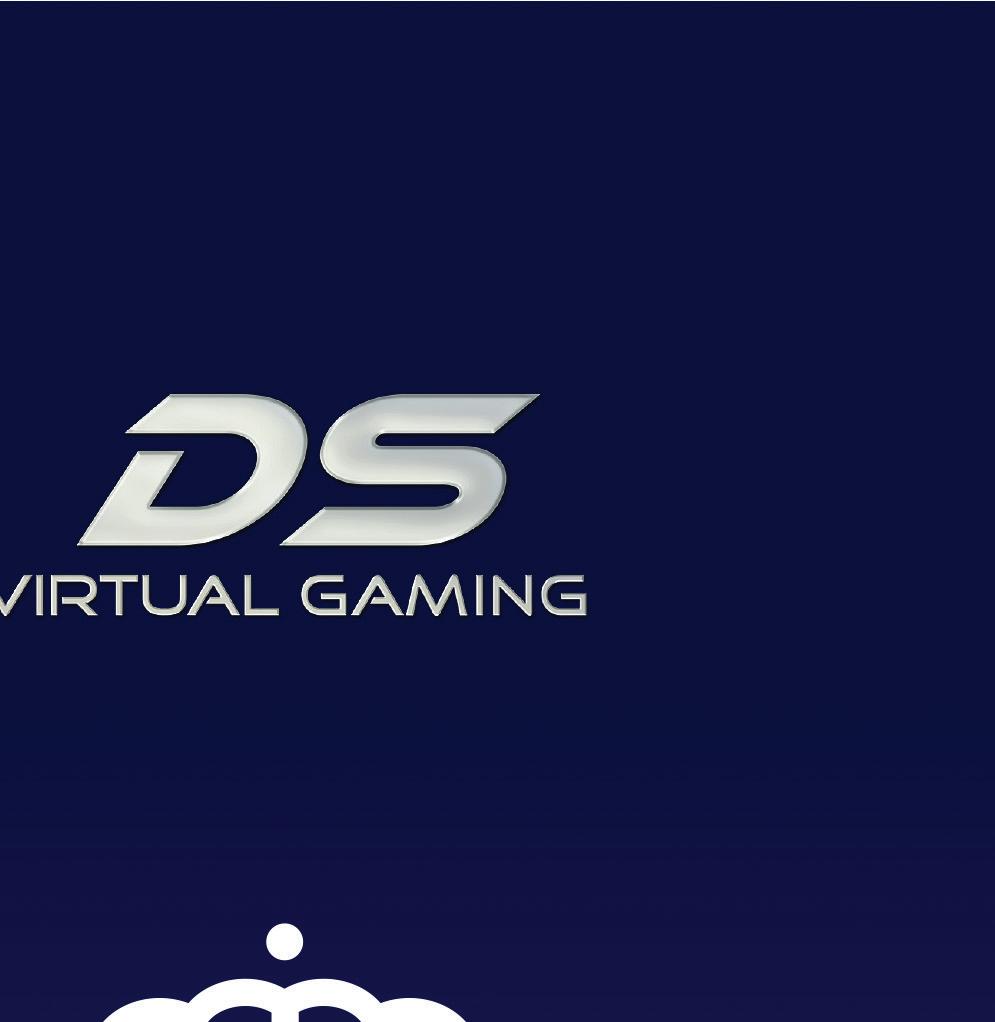










It is no secret that the gaming sector has been called out as being especially vulnerable to the dangers of money laundering. Casino activity is known for being cash intensive and involving high volumes of fast-paced transactions. In other words: music to the ears of money launderers.
Macau, being a vast gaming hub, is no exception. Up until recently, Macau was well known for its ‘junket model.’ Junkets (or ‘gaming promoters’) were vital to luring high rollers to casinos, by offering free accommodation, travel and other perks. Most importantly, gaming promoters were also allowed to provide credit facilities and collect debts. This would mean the junket program allows movement of funds to and from the casino, allowing the concealment of potential dirty funds and identity of money launderers.
The new Macau gaming law has shut down the typical junket model as we knew it. With the new restrictions – including the rule of exclusivity (gaming promoters may only be engaged by one gaming concessionaire) and prohibition of revenue sharing arrangements – junkets still operating in Macau are facing a difficult time. Additionally, to enhance the safeguarding of national security and to address further money-laundering and illegal cross-border flow of capital, the new law now prohibits junkets from depositing chips or funds (by itself or on behalf of others) – to further curb the movement of illegal assets.
The amendments introduced by the new law seem to be on the right track to respond to money laundering concerns. In fact, the changes show Macau’s promise to maintain its technical compliance with the Financial Action Task Force’s (FATF) 40 Recommendations, as previously echoed in the Asia Pacific Group on Money Laundering’s (APG) Mutual Evaluation Follow-up Report, published in 2019. But is it enough?
The anti-money laundering (AML) landscape is constantly changing and should continue to evolve to respond to new, and potentially more sophisticated, means to launder money. With new AML-related rules, such as those mentioned above, criminals will also adopt newer strategies to avoid being detected. Although junkets can no longer be a participant in the movement of funds, money launderers still have a variety of schemes to choose from, including structuring operations, refining techniques, colluding with other players and buying other players’ winnings, etc.
Macau authorities understand the need for an update of AML laws, regulations and guidelines, especially in the gaming sector, which continues to be the meal ticket of Macau’s economy. During the first Interdepartmental AML/ CFT Working Group Plenary Meeting in 2023, coordinated by the Macau Financial Intelligence Office, the Working Group has developed a Strategic Plan, highlighting the goal of continuous
improvement of relevant legal and institutional framework. Moreover, the Working Group also agrees that fostering local and international partnerships is key to combatting money laundering.

What can we expect? In strengthening the AML legal framework, Macau will most likely take inspiration in what the other jurisdictions are doing.
For instance, reviews on Macau AML/CFT legislation could lead to a restriction of cash payments and move towards cashless and digital payments – which is a possibility in land-based casinos in several US states. In fact, digital payments could greatly aid casinos in the enforcement of their compliance programs. Digital payments in casinos can improve patron identification and verification of source of wealth – thus enabling a proper risk profiling of patrons, as well as allowing traceability of funds/ monitoring of transactions.
However, digital payments in land-based casinos could lead to some responsible gaming issues, as cash could be a better option to maintain control over gambling spend. Notwithstanding, as a solution, a limit could be implemented on the payment platform to ensure the patron remains within the established budget.

Another possibility to enhance the current AML/CFT rules in the gaming sector is to lower the casino transaction threshold. Currently, among other situations in which due diligence is required, the gaming sector is required to identify patrons, beneficiaries of gaming credits, representatives and agents whenever they engage in large-sum transactions – which is currently set at MOP$500,000 ($61,972). Lowering the threshold could mean a bigger compliance cost – however, it may be necessary to mitigate the vulnerabilities of the gaming sector.
On another note, the amendments to the current AML/CFT legal framework in the gaming sector could see a re-definition and expansion of the regulator’s obligations and powers, and even the creation of enforcement tools, to deter future breaches.
In conclusion, gaming operators should stay current on regulatory compliance measures. When Macau AML/CFT legislation gets reviewed, the gaming sector should seek to update respective compliance programs and procedures, and organise immediate training of staff.


















India has recently witnessed a spate of new regulations and amendments, which will soon have a significant impact on how online gaming businesses operate and the regulatory compliances that they undertake. In this crisp round-up, we cover three important recent regulatory developments that every online gaming operator offering their products in India should be aware of. Each of these developments affect important aspects of an operator’s realmoney gaming business in India viz. taxation, data protection and verification of online realmoney games.
In mid-July, India’s Goods and Service Tax Council (GST Council), a constitutional body responsible for making recommendations
on issues related to the implementation of the Goods and Services Tax (GST), recommended imposition of 28% GST on the face value of the bet/entry fee in online gaming. Though this was slightly modified subsequently to mean 28% on the initial deposit made by a player with the platform rather than each bet/entry, the recommendations are a body blow to the burgeoning online gaming industry in India. Not only have these recommendations, in effect, obliterated the distinction between games of skill and chance as far as taxation is concerned but arguably also fall foul of the constitutional prohibition against treating unequals equally.
The taxation regime for online gaming was under deliberation for more than two years. A Group of Ministers (GoM) was first constituted by the GST Council in May 2021 and then re-constituted in February 2022 to examine the taxation for casinos, horseracing and online gaming. The first report of the GoM, which was placed before the GST Council in June 2022, had recommended charging GST at a fixed rate of 28% on the entire face value of the stakes, irrespective of the nature of the online game (whether it be of chance or skill). However, the GST Council could not arrive at a decision at that time and had asked the GoM to deliberate further and submit an amended report. The GoM had submitted a revised report in December 2022 but, in the absence of a consensus within it on the issue of GST valuation, had left the final decision to the GST Council.

So, now, if a user intends to add INR 100 to her in-game e-wallet, INR 28 will be additionally charged as GST (under the head of ‘supply of actionable claims’). Reapplication of winnings earned from a past contest of online game will not be subject to the 28% GST. Separately, winnings from online gaming above INR 100 will be subject to a tax-deductionat-source (TDS) under income tax laws at the rate of 30%, which will be triggered on each withdrawal or the year-end balance in the e-wallet.

It is important to note that the GST Council has also recommended that
foreign real-money gaming operators will have to mandatorily register themselves through a simplified registration process to discharge their GST obligations under this new regime. Platforms of non-compliant foreign operators will be blocked.
To give effect to these recommendations, suitable amendments to the central and Statelevel GST laws are required. On 11 August 2023, both Houses of Parliament passed the relevant amendments to the central GST laws and the same received presidential assent soon after. The States are now expected to soon enact the necessary amendments for their GST laws. Additionally, key amendments relating to rate and valuation are also pending to be prescribed by way of amendments to the relevant rules and notifications. This new taxation regime is expected to come into force by 1 October 2023, and the GST Council has agreed to review its recommendations after six months of the new regime coming into force.




On 11 August 2023, the Central Government published the much-awaited Digital Personal Data Protection Act, 2023 (DPDP Act) in the Official Gazette, thus setting the stage for the first-of-its-kind overarching personal data protection law for India. India has witnessed various iterations of a personal data protection law over the years, which have been introduced by the Central Government – the first of which was introduced in 2018 but was soon withdrawn. Subsequently, in 2019, another rendition titled the ‘Personal Data Protection Bill, 2019’ was presented before a Joint Parliamentary

“India has witnessed various iterations of a personal data protection law over the years”
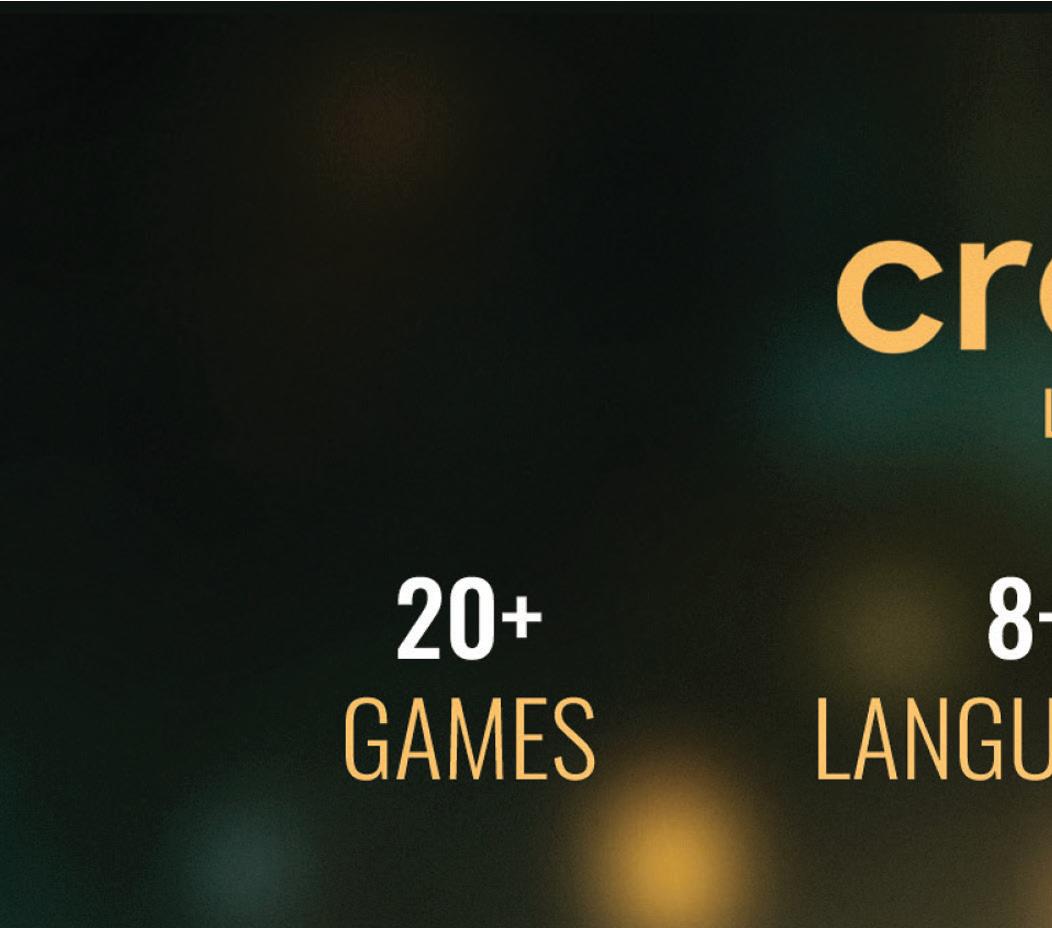










Committee, which tabled its report along with a revised rendition of the bill titled the ‘Data Protection Bill, 2021’ before the Indian Parliament in December 2021. The Data Protection Bill 2021 was thereafter brought up for consideration before the Indian Parliament but later withdrawn.

The DPDP Act is now the fourth and final iteration of the personal data protection legislation in India. It was first presented before the Lower House of the Indian Parliament, which passed it on 7 August 2023. The Upper House of the Indian Parliament subsequently passed the bill on 9 August 2023. On 11 August, pursuant to receiving Presidential assent, the DPDP Act was published by the Central Government in the Official Gazette.

Key aspects of the DPDP Act: The DPDP Act narrows its focus to the protection of ‘digital’ personal data, which is understood as any personal data in the digitised form about an “individual who is identifiable by or in relation to such data.” It seeks to regulate the processing of personal data in a manner that recognises the right of individuals to protect their personal data, and acknowledges the need to process personal data for lawful purposes. It prescribes various obligations on ‘data fiduciaries’ and ‘significant data fiduciaries’ while processing the personal data of ‘data principals’ (i.e. the user).
Applicability: The DPDP Act regulates the processing of personal data within India when collected in the digital form or in non-digital form and subsequently digitised. It also extends to the processing of personal data outside India if it relates to offering goods or services to data principals located in India. However, any data made ‘publicly available’ by the relevant data
principal remains outside the purview of the DPDP Act.

Obligations on data fiduciaries: Various obligations are stipulated for data fiduciaries while collecting, processing and sharing personal data, including, inter alia, stricter notice and consent requirements, obligations while processing personal data of children and persons with disabilities, obligations in instances of personal data breaches, obligations to update, correct and erase personal data and to provide data principals the option to withdraw consent, establishment of a grievance redressal mechanism, etc.
Legitimate uses: Data fiduciaries can process personal data without the prior consent of data principals for certain ‘legitimate uses,’ including when the data principal has voluntarily provided their personal data for a specified purpose and has not explicitly signified that they do not consent to such use.

Penalties: Monetary penalties of up to INR 250 crore ($30.3m) have been prescribed in cases of non-compliance with the provisions of the DPDP Act.
What’s next? Most importantly, the Central Government is yet to notify the date on which the provisions of the DPDP Act will come into force (different dates may be notified for different provisions). Hence, the provisions of the DPDP Act are currently not in force. Until such time as the DPDP Act comes into force, the Information Technology (Reasonable Security Practices and Procedures and Sensitive Personal Data or Information) Rules, 2011 framed under the Information Technology Act, 2000 will continue to apply.

In April 2023, the Central Government had notified a new legal framework for online gaming through amendments to the Information Technology (Intermediary Guidelines and Digital Media Ethics Code) Rules 2021. These amendments (Online Gaming Rules) propose a light-touch, co-regulatory regime whereby government-recognised, but independent self-regulatory bodies (SRB) will verify whether an ‘online real money game’ is to be permitted or not – in accordance with the baseline criteria prescribed by the Online Gaming Rules. The Online Gaming Rules will regulate online gaming platforms by treating them as an “online gaming intermediary” and by prescribing due diligence obligations

for them. However, the obligations under the Online Gaming Rules will come into effect on the expiry of three months from the date on which the Central Government recognises a total of three SRBs.
However, at press time, no online gaming SRB has been designated by the Central Government. Initially, it tried to expedite the process of applications by potential SRBs, by stating that it would commence verifying online games itself if the industry did not set up the SRBs as required under the Online Gaming Rules. But even after four applications being filed, the Central Government is yet to approve the applications and designate them as online gaming SRBs. One of the reasons which could have impacted the designation process is a recent petition that was filed by an NGO in the Delhi High Court questioning the constitutional validity of the Online Gaming Rules. The petition is currently pending at the preliminary stage. As per news reports, the four SRB applications have been made by (i) The Esports Players Welfare Association (EPWA), (ii) a consortium supported by two gaming industry associations — the E-Gaming Federation (EGF) and the Federation of Indian Fantasy Sports (FIFS); (iii) the All-India Gaming Federation (AIGF) and (iv) the All-India Gaming Regulator (AIGR) Foundation.







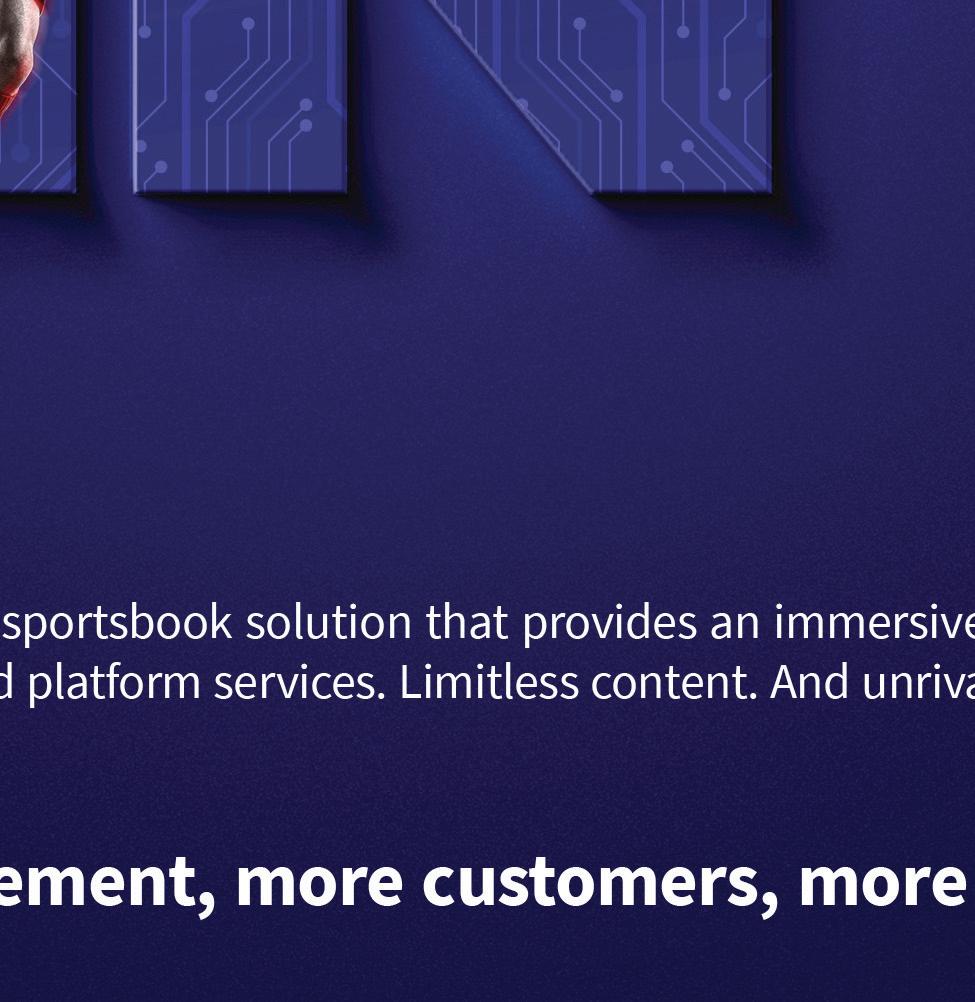

Gambling Insider speaks with Ivan Kravchuk, Evoplay CEO, about the pioneering of crossover fusions and what goes into the making of an online casino product
At iGB Live in Amsterdam, we discussed Evoplay pioneering crossover fusions with the likes of casino and sports betting. Are there any other fusion crossovers you’re looking into developing?
Our aim has always been to create immersive, cross-platform experiences that captivate a wide spectrum of players. From online casino enthusiasts to sports bettors and from casual gamers to adrenaline-chasing thrill-seekers; our games cater to all tastes and preferences.
We continuously strive to push boundaries, blending genres and defying traditional categories in our relentless pursuit of the next breakthrough in gaming. We’re deeply intrigued by the potential of integrating our games with sports betting. Our third focus is metamechanics. We’re experimenting with various mechanics and activities, such as tournaments and quests.
How do you go about making games as quick as possible for those users in LatAm that don’t have fast internet service and use old devices?
In regions like LatAm, we’re aware that players
may not always have access to the fastest internet services or the latest devices. We’ve also observed that instant games, which are quick and efficient, are significantly more popular than traditional slots here. This understanding shapes our approach to game development and optimisation.
Our goal is to ensure our games can run smoothly on a broad range of devices and internet connections. To facilitate this, we utilise our proprietary Spinential game engine, which

enhances the performance of our games by up to 10 times. This technology enables our games to load faster and perform better, even on slower internet connections or older devices.
What goes into the process of naming a product?
The process is somewhat complex and multilayered. There are substantial legal aspects to consider right from the outset, as we register
"Our main focus is to avoid any clashes with existing game mechanics. Beyond that, we believe this feature could significantly enrich our players’ experience across different games, making their gaming journey even more exciting and rewarding"









trademarks for each game to protect our intellectual property. This is a crucial step, although it can sometimes present challenges.
Once we’ve navigated the legal landscape, we shift our focus towards creating a name that aligns with our player’s expectations and the game’s unique attributes. The aim is to encapsulate the essence of the game within its name – think of it as crafting an accurate and enticing summary. This is where our dedicated creative team comes into play. They devote considerable effort to brainstorming and selecting names that are not only descriptive and appropriate but also memorable.









Could you elaborate on the research and development process that’s involved in the creation of innovative features like the random prize drop?
In the current gaming industry landscape, metamechanics play a critical role. The market is quite
saturated, so it’s crucial to continually innovate and introduce fresh, engaging mechanics.
We scrutinise what our competitors are doing, take note of wider industry trends, and – most importantly – we pay close attention to our players’ feedback. This in-depth analysis informs our decisions about where to channel our creative energies and investments.We closely monitor the performance metrics, analyse the response from our players and use these insights to further refine our mechanics.
Can you explain the mechanics of the new random prize drop feature and share your reasons for choosing to award prizes irrespective of the game outcomes?
The premise of the random prize drop is to add a twist of surprise to the gaming experience. It’s somewhat akin to the fundamental nature of iGaming itself. Regardless of how the game unfolds, there’s always that chance of receiving a

surprise prize. It’s this unpredictable element that keeps the excitement alive.








The decision to award prizes irrespective of game outcomes was driven by our understanding that everyone enjoys the feeling of being lucky. The unexpected reward gives players a sense of achievement and enhances their engagement with the game, making their experience more enjoyable and memorable.
What kind of rewards can players expect with this new feature? Are they gameoriented or have a financial value?

With the new random prize drop feature, the initial rewards are financially based, adding immediate and tangible value to player winnings. After the feature is launched, we plan to conduct an in-depth analysis based on the feedback and performance data we collect. Based on this analysis, we could potentially diversify the types of rewards offered in the future.
If the random prize drop feature proves to be a hit with your audience, is there a possibility of incorporating it into other games within your portfolio in the future?
Our ultimate goal is to integrate the random prize drop feature into as many games as possible within our portfolio. However, it’s crucial that we navigate this carefully. We need to adhere to certain technical norms to ensure seamless integration. Our main focus is to avoid any clashes with existing game mechanics. Beyond that, we believe this feature could significantly enrich our players’ experience across different games, making their gaming journey even more exciting and rewarding.
"We scrutinise what our competitors are doing, take note of wider industry trends, and - most importantly - we pay close attention to our players’ feedback. This in-depth analysis informs our decisions about where to channel our creative energies and investments"










This year’s historic revenue reflects the resiliency of many tribal gaming operations, and how tribal gaming continues to rebound and remain strong. Tribal governments and the operations they license continue to explore new and innovative ways to expand and deliver worldclass experiences in order to cultivate sustainable economies. In my travels I’ve seen how tribes across many regions have taken a comprehensive approach to improving business operations, for example, incorporating evolving technology like mobile gaming to enhance both player experience as well as the bottom line.
Across the Indian gaming industry, tribes pursue economic sustainability through gaming by relying on the robust regulatory reputation for which Indian gaming is well known, and made better when supported by effective and efficient measures. As we consider the past twoplus decades of gross gaming revenue (GGR) growth, change has been constant, and the National Indian Gaming Commission (NIGC)
has provided the complimentary regulatory environment to sustain such growth.
The FY2022 GGR is the highest in Indian gaming history, growing to $40.9bn. Seven of NIGC’s eight regions showed an increase over FY2021. The overall FY2022 GGR increase was $1.9bn, about 5% higher than the historic FY2021 GGR of $39bn, as operations emerged from the pandemic. It is important to note the year-over-year GGR change by region should not be used as a direct indicator of the local economy in any specific region. Many other factors could have an impact on the GGR at the regional level, such as new gaming operations, expansions or renovations to existing operations, temporary or permanent closures or changes in a gaming operation’s fiscal year.
For those who may not be familiar, the GGR figure is an aggregate of revenue from 519 independently audited financial statements of 244 tribes across 29 states. An operation’s revenue is based on the amount wagered minus
winnings returned to players. It does not reflect earnings before salaries, tribal-state compacts and operating expenses. If you’re interested in learning more about regional performance and other comparisons to FY2021, you can download the FY22 gross gaming revenue report from the NIGC website.
NIGC works closely each year with more than 5,000 regulators to help each tribe prepare for challenges to their unique strategies for success. And from a regulator’s point of view, when these strategies are synchronised with lawmakers’ policy objectives it’s reasonable to assume record success, like this year’s $40.9bn GGR, is more likely to occur. This success directly relates to how tribal regulatory professionals execute their duties day-in and day-out. Cultivating this regulatory role requires collaboration and


















support for the tools and training that will focus regulatory capacity around effective and efficient regulation.
Effective and efficient regulation accounts for the shared interest held by governments, consumers, and industry stakeholders to protect gaming assets. It also can serve to honour tribal governments’ sovereign authority, recognise the cross-jurisdictional effects of gaming regulation, protect Indian gaming’s decades-long reputation for integrity, support responsible industry innovation, and promote Indian gaming’s continued potential for a positive and sustainable impact on regional economies and tribal governments’ self-sufficiency.
As tribes continue to execute and shape a strategy for success in the face of new and emerging technology, their ability to adapt has been critical. The industry needs to be acutely aware of the increasing complexity of cyber threats as Indian gaming grows in its application of sports betting, virtual wallets, and mobile gaming. As tribes and their operations continue to chart a path forward in these growing areas, the regulatory community can continue its role in ensuring confidence in tribes’ vigilance for safeguarding their operations.
New technology uses create potential new opportunities for well-regulated play. NIGC stands ready to provide technical assistance and regulatory tools necessary to prioritise compliance, and to protect the valuable resource gaming represents to many communities. For additional information on how NIGC is keeping up with these and other challenges and changes, please view the Agency’s annual report.

In turning its attention to technology, NIGC has learned that while technology may pose threats to tribal operations, it also presents an opportunity to promote more efficient and focused regulation. Whether a threat or an opportunity, technology provides tribal lawmakers a reason to articulate more focused and updated oversight objectives, to design more multi-year budget planning strategies, and to demonstrate the Indian gaming community’s dedication to innovation and support for sustainable industry growth.
The investment by industry stakeholders in technological advances can be driven in part by innovations to solve challenges that otherwise limit opportunity for growth. From its national regulator’s perspective, NIGC’s report on the Indian gaming’s gross revenue trends can be informed by knowledge about the support for technological advances in the industry.
Although NIGC’s GGR Report does not announce significant costs that contribute to the net revenue values for Indian gaming, it is noteworthy that in recent years tribes are deciding to increase investments in technology. The historic FY2022 GGR may be due in part to Tribal governmental gaming’s dedication to reinvest into the technology trends and underscore the strength of tribes’ dedication to a sustainable future for Indian gaming. Whether for market competition reasons such as new mobile or cashless systems targeting a specific customer, or technology to achieve a regulatory objective articulated by tribal lawmakers such as responsible gaming monitoring or cyber infrastructure security, Indian
gaming continues to invest in technology and continues to be an industry marked by constant evolution.


For over a decade and with the exception of the historic impact from unprecedented closures due to the Covid-19 pandemic, the overall national profile for Indian gaming’s revenue has shown consistent growth. In reaction to a number of circumstances, including the uncertainty from the pandemic, financing and reinvestment trends, as well as the influx of mobile and sports betting platforms in a growing number of jurisdictions, the Indian gaming industry continues to evolve. In order to help Indian gaming’s stakeholders plan for a sustainable future and to educate the public about the regulatory community’s dedication to keeping pace with industry trends, NIGC may, at some point, build on what it shares as part of the GGR report. But only if any future expansion in the annual reporting content is done in consultation and collaboration with Tribal governments.
Perhaps NIGC’s future year reports could consider indicators that explain trends in class II, or even class III gaming’s over all footprint. The report might also consider employment insights the NIGC deduces from the number of new licences for gaming enterprise officials based on tribal background investigations and licensing notices that tribes submit to NIGC. Future data may one day include a breakdown of revenues that include mobile offerings or other games yetimagined, now possible through new technology and of course, effectively and efficiently regulated. Possible future additions of anonymous data in the GGR would likely assist an ever-changing industry, and aid tribal lawmakers and regulators in planning efforts to meet their respective missions.
Insight into Indian gaming’s revenue helps to inform the public’s understanding of Indian gaming’s impact and can serve as a reminder to regulators about the importance of efficient and effective regulations. As gaming tribes confront more opportunities for increasingly complex technology uses, and as each tribe charts its own path to recovering from the pandemic’s unprecedented impact, reporting tools such as the NIGC’s annual revenue report can help tribal lawmakers, regulators and Indian gaming operators to not only move beyond $40.9bn in revenue, but also increase collaboration to support the sustainability and value of Indian gaming’s regulatory framework.
As a reminder, the NIGC Division of Technology is available to assist with technical assistance (TA) and any IT related questions. For additional resources or to schedule IT or TA services, please contact itsupport@nigc.gov or visit the NIGC Division of Technology website.









Gambling Insider takes a look at the world of platform providers with Soft2Bet , EveryMatrix , SoftGamings and Digitain
GILAD NAIM







is the Chief Commercial Offices at Soft2Bet with 10+ years of in-depth experience in the iGaming industry. His key expertise areas include payments, risk assessment, identity verification and other operational matters. As Soft2Bet’s CCO, Gilad leads the company’s expansion, execution of forward-thinking objectives and implementation of commercial strategies.














STIAN ENGER PETTERSEN started his career in iGaming in 2005. He successfully managed B2C operations for several years before joining EveryMatrix in 2015 as a Product Manager for the Casino Business Unit, deeply involved in the building of the Unified Bonus System product. Today, Stian’s advanced technical expertise is used to lead the CasinoEngine business unit and to establish the product as the go-to casino productivity platform in iGaming.




ARTYOM USTINOV
is the Head of White Label & Turnkey Solutions at SoftGamings and has been working in complex B2B/B2C sales, as well as business development and management consulting in iGaming for more than 10 years.












MARGARITA CRUZ has over 20 years of experience and a track record in sales and commercial roles across continental Europe, Latin America and North America, is now part of the Digitain Group of companies’ leadership team as Senior Sales Director. Margarita brings a wealth of experience in the iGaming industry, with extensive expertise in international operations and sales strategies.



WHAT DO OPERATORS WANT MOST FROM PROVIDERS RIGHT NOW, IS IT SPEED OR ANOTHER CHARACTERISTIC?











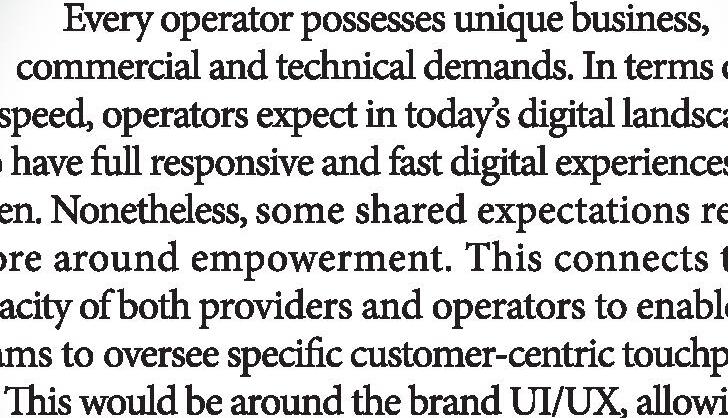







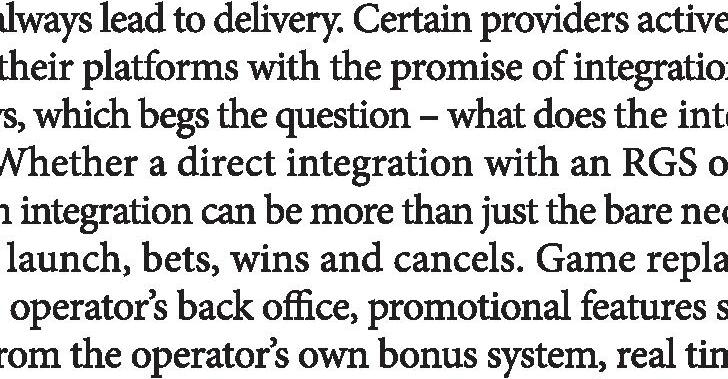










TAKING REGIONAL JURISDICTIONS INTO ACCOUNT, HOW IS THAT IMPACTING HOW PROVIDERS ARE BUILDING THEIR PLATFORMS?







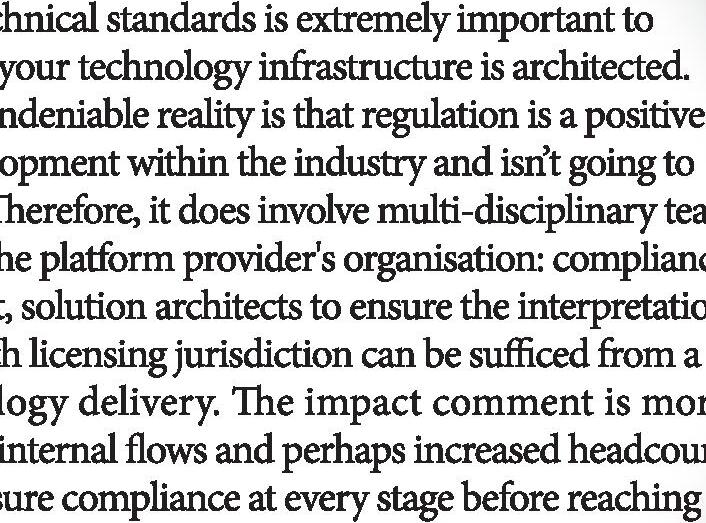














































































HOW HAVE PLATFORM PROVIDERS EVOLVED IN THE LAST DECADE?
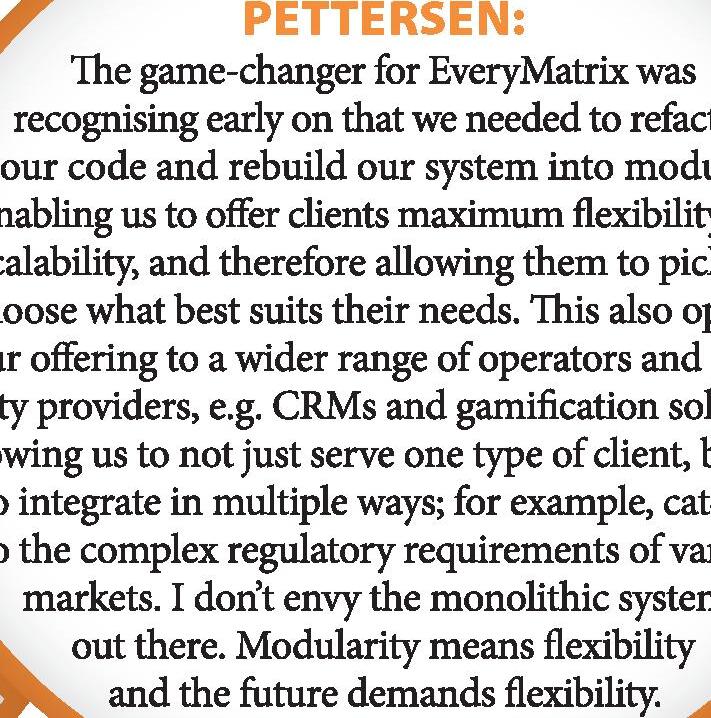






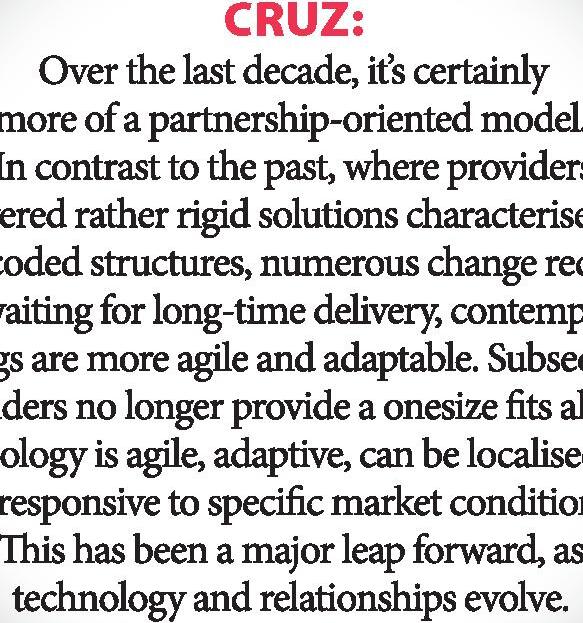




























































GOING FORWARD, WHAT INNOVATIONS ARE OPERATORS LOOKING FOR, WHAT DO THEY WANT MOST?











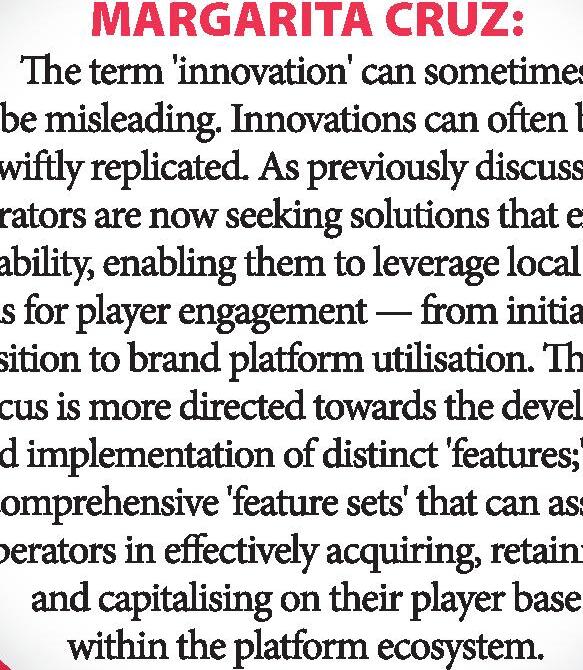









































































































































































































































































































Mridula Saini, Chief Revenue Officer at Ikasi, highlights how the use of AI in casino marketing is helping player experiences and how this can lead to greater profits
It’s no secret that individuals are fairly susceptible to flattery and enjoy it when other people pay attention to them. As humans, it confirms our belief that we’re somehow special – or at least a bit different. This is why people like it when a business takes the trouble to get to know them and treat them differently than other customers by identifying and catering to their specific personal preferences.
It’s clear that the more successful a business is at making its customers feel exceptional, the better it performs in areas like customer satisfaction, loyalty, retention, sales, ROI and revenue growth. Customers reward businesses that deliver a truly personalised experience. Not only is the experience enjoyable for the customer, but almost by definition, it conveys a strong sense to them that he or she is valued. Today, no technology has proven itself more capable of delivering a highquality personalised experience to thousands or even millions of customers simultaneously than artificial intelligence (AI). The power of AI to deliver personalisation en masse derives
from its ability to identify patterns in customer data – patterns that are generally imperceptible to individual human beings and are often missed by standard data analysis tools.
In the casino environment, AI is capable of leveraging customer data and thousands of external data points to gain insight into who a customer is both psychologically and behaviourally. This insight goes well beyond what can be gleaned from basic demographic indicators like age, income and educational background. Until the advent of AI, market segmentation, which relied on these indicators, was the go-to option for figuring out which customers would respond to which marketing actions. As a result, customers were simply dumped into broad-based marketing categories on the basis of a handful of characteristics.
However, with the help of data proliferation, AI is making market segmentation redundant for the simple reason that it successfully shifts the focus almost entirely to the wants and needs of the individual customer – or, in the context of casinos, the individual gambler. Having identified patterns in vast swathes of player data, AI – using predictive analytics – is able to draw conclusions about how specific players are likely to behave
in specific situations. In a casino context, the system is capable of determining, among other things, which games a player prefers, when and in what order they select them, how much he/ she typically bets and when and what type of incentive is sufficient (and not overly-sufficient) to convince the player to respond positively to an offer or promotion.
The system can also identify an endless number of extremely subtle distinctions that can – and should – have a profound effect on marketing. A good example is the fact that some players prioritise winning above all, while others gamble primarily for the fun of it. Being able to separate the two is crucial, because it tells a casino who should receive offers focused on financial incentives, such as bonuses and who should receive offers tied to new games and guaranteed thrills. Unlike the older segmentation models, AI draws conclusions about the best ways to engage with, and incentivise, players at a level that is most meaningful to the individual.
It’s also important to keep in mind AI’s growing capacity to integrate external data, including mobile, social and geo-location data. This blend of customer and external data gives casinos even more capacity to tailor highly-

personalised messages, offers and experiences, to a degree that would have seemed absurd a decade ago.










Earlier, basic platforms left the responsibility of crafting these offers and experiences to a casino’s marketing team, especially when time isn’t a factor like it is with seasonal marketing campaigns, for example. Advanced AI platforms, however, run autonomously and respond to player activity using real or near real-time, next-best-action. They can create and deliver just the right offer to just the right customer at just the right moment, with remarkable consistency. Many of these machine learningbased systems can adapt and grow even in the absence of explicit programming. They absorb all experiences, positive or negative and, in effect, they become smarter and more capable over time. The more data they can access, the more success they have appealing to customers.
The key driver of personalisation is the desire to deliver the optimal experience to each customer because a superior experience translates directly into higher customer





satisfaction, retention and spending. A player’s Lifetime Value (LTV) is the amount by which revenues from an individual player over time exceed the casino’s cost of attracting and servicing that player. AI, by introducing immense and everincreasing efficiencies into marketing, allows businesses to dramatically lower their spend over time. Not only can marketing deliver better results, but customers also benefit from the increased level of personalisation and, in turn, are responding with increased loyalty and spend. Exposed to perfectly calibrated offers that push all the right buttons, casinos are lowering their costs and realising more frequent spending and engagement that increases player LTV substantially.

AI is increasingly central to helping casinos deliver the ultimate customer experience. It cannot only identify player preferences and tendencies but can also predict player behaviours, and then create and deliver personalised offers and incentives that take direct account of this understanding. Simply put, AI can create personalised appeals that players have a difficult


time resisting for the simple reason that the appeals are designed specifically for them.







Equally important is the fact that AI delivers this vastly improved customer experience continuously at scale. For casinos, this translates into substantial returns and gives them the ability to predict (and achieve) greater player satisfaction/retention, higher player spend & LTV and vast increases in revenues over time.











In every issue, GamblingInsider commissions guest columns and interviews with people at the heart of the gaming industry – to discover more about the challenges its leaders, pioneers and innovators face. These contributors form The Insiders

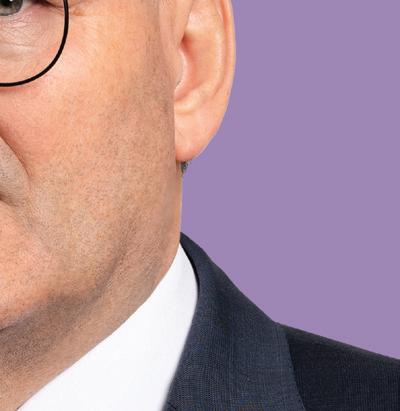
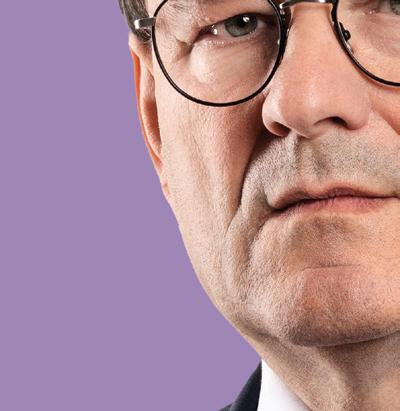




















Gambling Insider speaks with MiFinity CEO Paul Kavanagh, to discuss the popularity of eWallets, UX, keeping up with technology, key markets and the future

associated with traditional methods. MiFinity’s eWallet also offers transparency and visibility into the ePayment process, enhancing customer trust and satisfaction. Improved merchant relationships through ePayments highlight how eWallets contribute to more positive interactions between consumers and businesses.
How does a payments company achieve the perfect user experience?

Is ‘perfection’ possible here?





At MiFinity, we strive for perfection, but the market is continually changing, so we’re constantly adjusting the goalposts to meet the evolving needs of our users and partners. This year, for example, we launched our new app and desktop experience, which uses the latest app architecture to deliver intuitive features, personalised offers, biometric authentications and a faster sign-up process for new users.
Talk us through your key markets and products right now.
European markets are growing exponentially, with increased market share gaining each day. Other markets MiFinity is getting traction include LatAm, whose regions have a strong iGaming demand, but payments can be challenging. Our wide range of payment methods is integral to addressing these challenges and providing tailored solutions to businesses and players in these markets.
IGaming is always going to be a key focus for MiFinity. We developed our eWallet specifically for this market. However, we are also gaining traction in the travel industry and eCommerce. Our users increasingly want to use their MiFinity eWallet for transactions other than iGaming, so we are partnering with a wide range of merchants.
Heading into 2023, how would you describe the popularity of eWallets?
Is the ‘average’ bettor now typically aware of eWallets?
The popularity of eWallets has been nothing short of revolutionary in the iGaming industry. The MiFinity eWallet is a case in point. It’s rapidly grown in popularity over the last two years. Earlier this year, we surpassed 500,000 customer accounts and it’s quickly become the preferred payment method for many of our users and partners. The reasons behind this include the Covid-19 pandemic, which accelerated the adoption of digital payment methods. In this context, MiFinity’s eWallet undoubtedly experienced increased traction as people shifted from traditional cash transactions to safer digital payments.
Other factors that make eWallets attractive for businesses and users include reduced transaction costs, heightened security and the convenience of fast transactions without the usual delays
For a payments company that always needs to innovate and keep up with technology, what is next on the roadmap?
We’re developing new features across the MiFinity app, desktop and iFrame. These are geared towards further enhancing the overall user experience and elevating our services to a new level of excellence. They will be introduced in the latter half of 2023 and early 2024. Further integration of open banking is also on our roadmap. We already leverage open banking for some of our payment services and we’ll be rolling out additional solutions to make purchases on mobile devices, remittances and currency conversions even more convenient. Additionally, we’re working on customising our products to offer personalised services so users can access multiple accounts through a single app, with the ability to monitor their financial status and purchases effortlessly. We’re also exploring integrating AI-driven solutions into our products, aligned with our users’ needs and the value the technology offers.
Forex is another important industry for us. Our expertise in providing payment services for heavily regulated industries, facilitating cross-border industry transactions and offering multiple payment methods means MiFinity is a very attractive proposition.
Could 2024 see your key markets and products change?
Absolutely. The fintech landscape is characterised by constant evolution and 2024 could indeed bring about change. This volatility stems from our industry being closely tied to regulatory requirements, which can significantly impact our markets and products. Being prepared for these often unknown changes is a fundamental aspect of our approach.
Trends such as the widespread adoption of digital payments, the surge in mobile banking and the demand for financial services in emerging markets mean we must have an agile mindset at MiFinity. Consumers are actively seeking new and convenient ways to manage their finances; and we’ll continue to meet this demand by offering forward-thinking products and services.
Ryszard Presch, Member of the Board at Novomatic, speaks to Gambling Insider about slot industry trends, Latin America, the Philippines and more





When talking about the slots industry as opposed to the iGaming segment, I believe the latest trends all have one aspect in common: they seek to differentiate an exciting gaming experience in a land-based venue from a virtual and remote gaming offer. For example, the fact that progressives remain exceptionally popular is, in part, owed to the live winning atmosphere on the casino floor whenever a player hits a jackpot. At the same time, a prevailing trend in cabinet design has for a number of years been bigger, wider, XL –with the effect of augmenting the immersion aspect of the gaming entertainment experience. Casino management systems help create a holistic and highly personalised landbased customer journey, while at the same time closing the gap to the operator’s iGaming offer; acting as a cross-conversion interface towards the operator’s iGaming offer, which encourages customer traffic in both directions. Our industry has always been in constant motion, only the pace and diversity have accelerated.
Which markets are currently the most exciting on your radar? Chile, India and Ecuador are just some names mentioned by the industry recently.
Our focus is on all regulated Latin American markets, which means we monitor the developments in these markets very closely; to evaluate possible future growth potential within their respective local industry segments, subject to proper regulation. Further key growth regions that remain in our focus for further land-based and iGaming development are the US, Asia, Africa and of course the various European markets.
Can you talk us through your recent new partnerships? Particularly your distribution agreement with Tecnet for the Philippines – what are your hopes for that market?
We are pleased to have brought on board Tecnet Asia, an experienced partner for the Philippine market. As a local industry expert, Tecnet is a reliable distribution partner with an excellent service infrastructure. The APAC region is of great importance for Novomatic’s further growth and the Philippines is one of the key gaming markets in the region.
Can you tell us about how operations are going at Crown Gaming México, given the recent appointment of a new Commercial Director?
Novomatic has been active in the Mexican market for more than 20 years, with a loyal



customer base and a top-performing product portfolio that is well established with operators and players alike. With Enrique Manjarrez, we have now gained an outstanding sales and operations expert with – also – almost 20 years of experience in the gaming industry. We are looking forward to working with him and, with his many years of expertise, we will continue to leverage the unwavering growth potential of the Mexican market. His in-depth market knowledge and strategic focus will be an asset to our group subsidiary Crown Gaming México.
Finally, how do you reflect on your brand value increase within the Brand Value Study of the European Brand Institute, announced earlier this year? The European Brand Institute annually evaluates the brand values of companies and this year certified Novomatic as having the highest increase in brand value among the companies based in Austria. We are naturally pleased about this, because this confirms not only the success of our brand strategy but also the great trust of customers in our products and services. And we are also pleased with our excellent ranking in the Sustainable Brand Rating, in which we currently occupy fourth place. Based on the increase in brand value, as well as the top ranking in the Sustainable Brand Rating, we see that we are on a sustainably successful path with our guiding principle, according to which success is only achieved by taking responsibility.
"Casino management systems help create a holistic and highly personalised land-based customer journey, while at the same time closing the gap to the operator’s iGaming offer"


meaningful insights has become not only impractical, but also, almost impossible. The volume of data has reached such staggering proportions that only a fraction of it could be processed manually; and even then, the results would be far from comprehensive. In this era of ‘big data,’ operators find themselves in need of technology that can swiftly and efficiently process the monumental quantities of data at their disposal; and this is where artificial intelligence (AI) takes centre stage.
effectively. It empowers operators to process an unprecedented wealth of information, enabling them to assess the risk associated with specific player accounts, bets or sports events. This, in turn, allows operators to proactively limit their financial exposure and thus garnering a more resilient and sustainable business model.
The sports betting industry is in the midst of a dynamic transformation, characterised by continuous growth, evolving market landscapes and ever-increasing regulations. This metamorphosis has ushered in an era where the consumption of betting products and services is soaring to unprecedented heights, due to the 24/7 nature of live sports, which sees millions of bets being placed globally on a daily basis.
This staggering volume of betting activity has given rise to a wealth of data, so deep and extensive that it has become a pivotal asset for operators seeking to elevate the performance of their businesses. It offers operators a unique opportunity to understand the different traits that shape up the modern bettor, and gain invaluable insights into how customers engage with their products and services.
This isn’t the first time that data has played a pivotal role in the betting industry. Understanding customer behaviour through data analysis has been a cornerstone of successful operations for years. However, what sets this era apart is the sheer scale of data now available and the increasingly sophisticated tools that allow operators to interact with it in real-time. The notion of manually going through thousands upon thousands of unique betting accounts to gain
AI, often coupled with machine learning technologies, has emerged as the beacon guiding operators through this world of big data. It provides the means to analyse this dataset and unearth insights that hold value for their businesses. The practice of data-driven decision making has become commonplace as operators increasingly rely on cold, hard facts, metrics and data to inform their strategic choices, aligning them with overarching company goals and objectives.
While the potential applications of AI extend across all areas of an operator’s business, certain areas hold particularly great promise. Among these, trading and risk management stand out as focal points of interest. These domains present unique challenges, including the need to analyse and respond to player activity in realtime, the aspiration to enhance profit margins by harnessing player-generated data, and the ongoing pursuit of identifying and curbing suspicious behaviour.
Automated risk management, underpinned by advanced data processing and AI, offers operators a powerful toolset to address these challenges
AI-driven automated player profiling solutions meticulously analyse customer data, piecing together precise profiles of each bettor’s behaviour. Through a sophisticated examination of a vast array of data points, these solutions evaluate the risk each individual poses to the bookmaker, prompting the risk management team to take timely and informed decisions.
Crucially, this risk assessment doesn’t rely on the disclosure of personal data. Instead, it draws insights from a bettor’s wagering patterns and behaviours, resulting in a detailed picture of their risk profile. This allows operators to in-turn tailor their offerings to different customer groups. For instance, they might offer more favourable odds to trusted players or high value players. These adjustments happen in real-time, adapting to the ever-shifting context and enhancing the overall player experience without compromising on risk control or profitability.
In this ever-evolving landscape of sports betting, AI is not just a tool; it’s a gamechanger. It’s the tool linking this vast field of data with meaningful and actionable insights, guiding operators in what can be treacherous waters of risk management. Ultimately, it’s the tool that ensures operators stay ahead of the curve and provide a safer, more rewarding experience for every bettor.
"What sets this era apart is the sheer scale of data now available and the increasingly sophisticated tools that allow operators to interact with it in real-time"
Irina Cornides, Pragmatic Play COO, looks ahead to a landmark release for the supplier and how the development of original franchises can hold the key to expansion, not just in the slots category but across the board




Can you tell us about your upcoming launches? Are there any products in particular you would like to highlight?





We’re delighted to have recently launched our 10th Big Bass game on 28 August. Big Bass Hold & Spinner Megaways is the latest release of one of our most popular slot series The creation of 10 games is testament to how popular both the theme and star character have become, so to keep delivering on excitement, we’ve created a new twist for our Big Bass fans. Launching later this month is our second-ever crash game –Big Bass Crash. With Spaceman being well received due to its multiplier elements and quick-decision-based action, Big Bass Crash will utilise familiar mechanics, but feature everyone’s favourite fisherman.
Our focus has always been to create immersive, engaging titles that players love coming back to time and time again, and our Big Bass series is evidence of this. Fishing games are incredibly popular with players, and more and more are released in the industry every month. We stand apart by adding new mechanics, twists and features to ensure every game brings something different While we’re incredibly pleased to have hit 10 games for Big Bass, the hard work doesn’t stop there. We’ve got something else big planned for the franchise, so stay tuned.
For game designers and suppliers, what is the key to creating a slot franchise that resonates with players?
While there are numerous routes to building a slot franchise, one element we focus on is leveraging popular characters across our roadmap. Players will now load up a Big Bass game knowing the fisherman character will be on the reels. He has swiftly become synonymous with the Big Bass slot experience. We use this method across several of our other popular games as well; for example, the John Hunter series
Recently, we’ve been expanding on our Greek universe, with Zeus making his landmark debut in both Gates of Olympus and more recently in Zeus vs Hades — Gods of War. The popularity of Zeus and the Greek theme opened
up opportunities to expand the narrative to introduce other heroes and heroines, such as Athena in Wisdom of Athena, and the birthplace of Titans in Forge of Olympus, all of which occur in the same universe to convey a sense of continuity in our latest thematic launches.
On another note, can you tell us about Pragmatic Play’s plans for live casino? Our focus has always been to continue to push boundaries with new game show formats and blending of game categories, as we twist, transform and elevate our live casino titles.
One development we’re particularly excited about is our upcoming game show, Treasure Island, which combines quest-based gameplay, as players search an immersive world for a variety of gems. We’re confident players will love the multifaceted environments we have created, with cinematic visual effects, from rolling waves, to swaying trees and many more. We’re also always refining our offering by adding new elements to our portfolio, from our new VIP and privé lounge tables, to native dealers for our non-English language titles
How competitive is the live casino market at the moment? Live casino is less competitive in comparison to slots. The barriers to entry are very high; it’s capital-intensive in nature and there are technological requirements and infrastructure involved in addition to the need for having a well-staffed operation to run the studios.
However, this doesn’t mean it’s a closed shop, and we have certainly seen a rise in the number of providers, which is great for the industry as a whole. It means more choice and better variety for players and operators. While more suppliers are entering the market, it’s a growth we welcome and want to see more of at Pragmatic Play.
It drives us to keep pushing our offering to new heights. It’s only a taste of what’s to come and we’re just getting started, but it signals a very exciting future ahead for the new possibilities we’re creating within the live casino space.
"Our focus has always been to create immersive, engaging titles that players love coming back to time and time again, and our Big Bass series is evidence of this"



providing our services to both new and existing customers in potential new geographic locations outside of Gibraltar.


How does Gibtelecom stand out from other telecommunications companies?

Although based in Gibraltar, Gibtelecom not only focuses on its home market but also drives to expand its international presence, providing a wide range of comprehensive solutions for locations external to Gibraltar, encompassing Cloud in the form of IaaS, Shared Cloud, Hybrid Cloud, Managed Security Services, Cloud Connect, Global Connectivity and more. Gibtelecom’s infrastructure is specifically designed to prioritise security and reliability.
In the iGaming industry, where data security and low latency are critical for function, Gibtelecom’s focus on these elements becomes a significant advantage for clients seeking robust and trustworthy solutions. Additionally, Gibtelecom’s offering guarantees that our client’s data is held in-jurisdiction, in compliance with regulation.

of 2022 a similar data centre was launched in Malta, being one of the best-connected Maltese data centres and the only one with direct connections to Africa.
The end of 2022 saw a further data centre with full cloud stack launched in Dublin. All these locations can be used to provide a single global network, with direct on-net connectivity between sites, allowing for multi-site backup and the ability to meet jurisdictional requirements for multi-country operators. Gibtelecom’s data centres have independent power and are backed up by UPSs as well as a dedicated standalone generator. Its power and cooling systems, as well as its international connectivity links, offering full redundancy, ensure they are unaffected by power disruptions and can run indefinitelyas long as fuel is available.
Interestingly, as a Gibraltar-based telecommunications company, last year you launched operations in Malta. How have you found this new expansion?
How do Gibtelecom’s offerings contribute specifically to the iGaming industry?
Gibtelecom prides itself on being a strategic partner in the iGaming industry. Our bouquet of Managed Security Services and Cloud Connect provide the iGaming industry with the right tools and infrastructure to operate efficiently, securely and competitively in the global gaming landscape. We continually work to further develop our Cloud Connect product, which allows for seamless direct access via Gibtelecom’s own private network, to the top hyperscale providers with a cost effective dedicated connectivity solution. The primary focus moving forward for Gibtelecom, within the iGaming industry, is to diversify our international presence,
Gibtelecom’s Cloud offerings deliver a highperformance dedicated cloud infrastructure platform on a service-based consumption model. Through our customer portal, which has automation and orchestration capabilities, clients have a self-service experience, allowing them to create and manage their infrastructure environments in a matter of minutes.
How does Gibtelecom evolve with the changing needs of the industry?
Given the ongoing effect of Brexit and general alterations in the regulatory landscape, Gibtelecom has sought to offer services which cater more specifically for the EU and Asia markets. In May 2021 Gibtelecom launched its first Asian Data Centre in Malaysia, offering hosting, managed solutions and its full portfolio of Cloud services.
This was subsequently extended in 2022 to offer direct connectivity to our point of presence (PoP) in Singapore. At the start
Over the years, Gibtelecom has been engaging with operators in Gibraltar and beyond to deliver the infrastructure that has built the foundations for them to grow. The launch of a PoP in Malta was something Gibtelecom had envisaged rolling out and developing for quite some time.
Having always communicated strongly with our customers and listened to their needs and wants, Gibtelecom has consistently developed offerings which have adapted to the changes in technology and regulation.
The launch of Cloud services in Malta signifies our commitment to data sovereignty within the jurisdiction, setting us apart from the standard Hyperscale providers. Gibtelecom’s launch in Malta has been extremely successful so far with a steady up-take of our services to date, reflecting the consistent and growing adoption rate of our services and adaptability to industry dynamics.



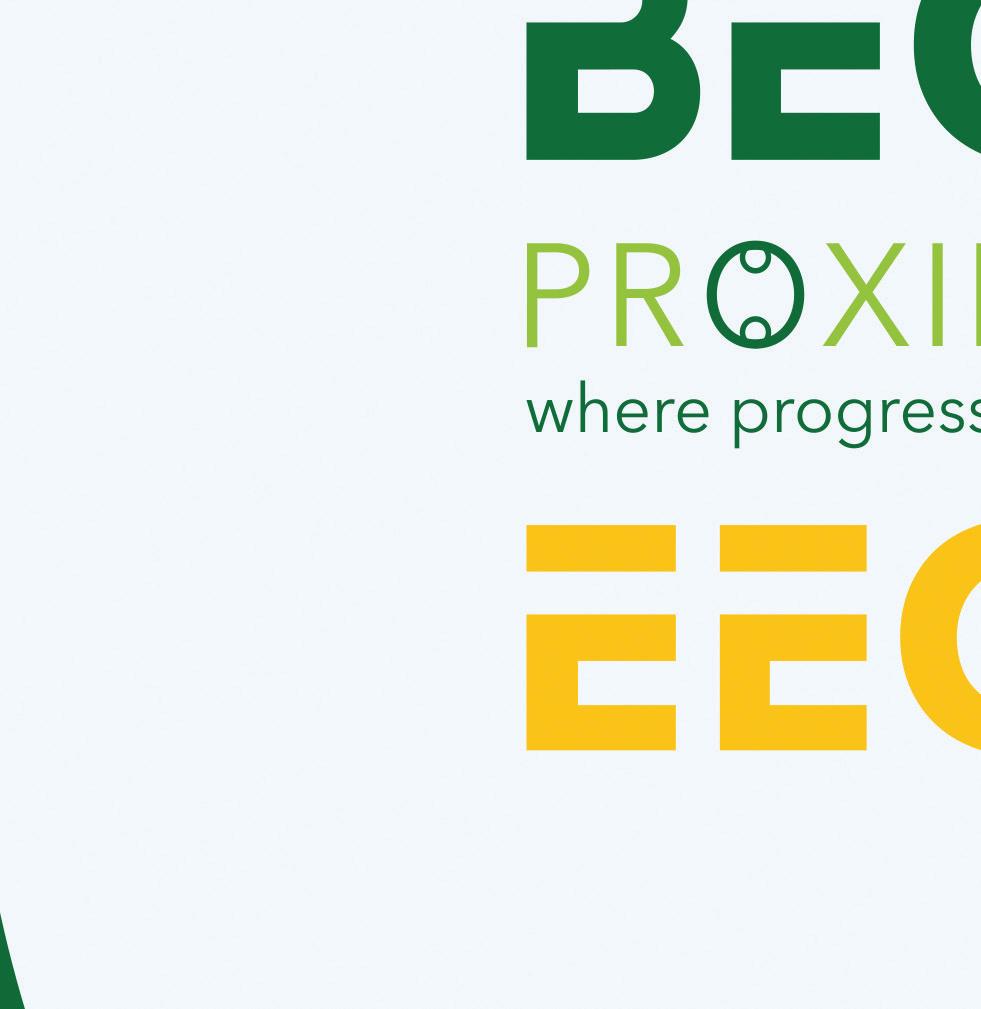
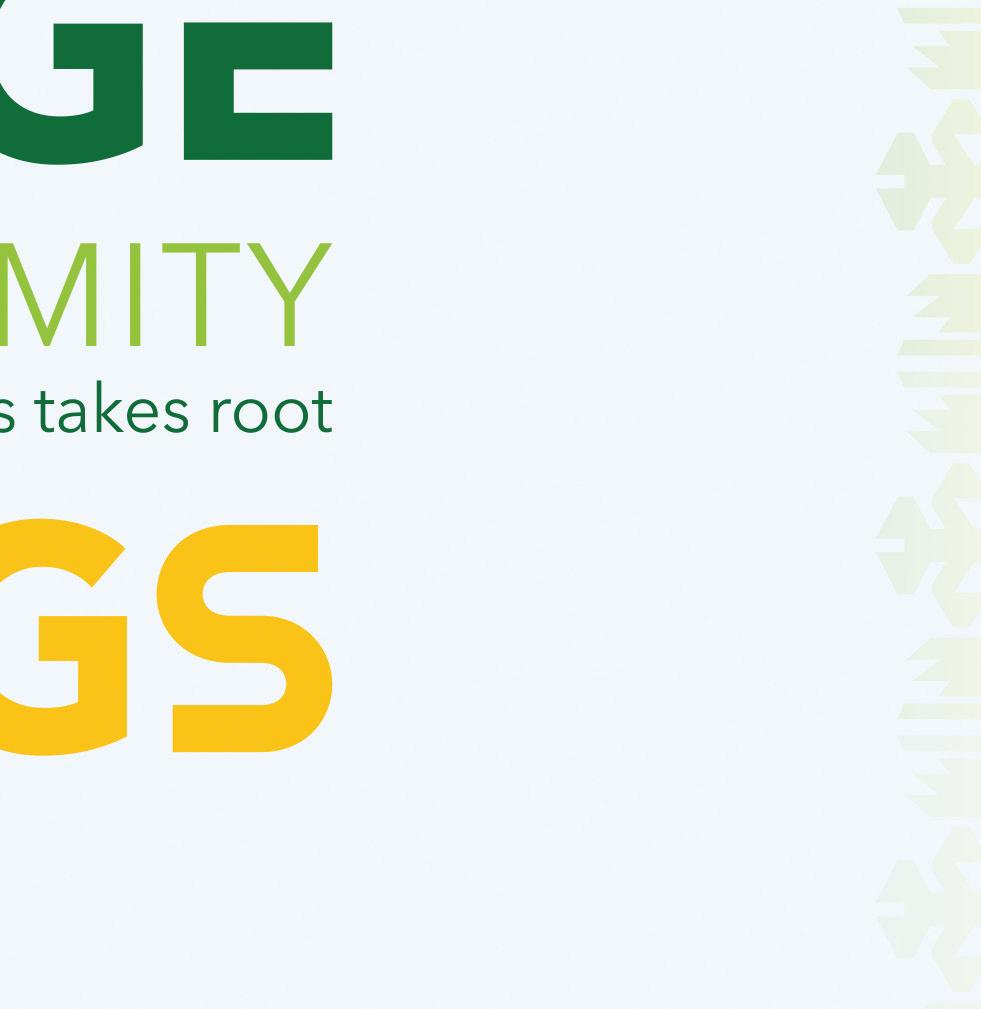




The coins fall and fill the pagoda as the casino operators and players keep enjoying and winning with Jin Qián Link - the latest slot product launched by FBM in Mexico. Eternal Niao Wang, Golden Lóng, Great Weiyan and Lucky Guī are the four games of this pack, which contains Mini, Minor, Major and Grand jackpot levels and a special bonus prize.
The graphics and sounds deeply connected with the Asian culture create an immersive gaming experience where players can taste the Oriental atmosphere and wealth with mystical

creatures such as the immortal phoenix, the brave white tiger, the wise turtle, or the powerful dragon.

While players explore the symbolism of these characters, they can access the Jin Qián Link bonus mode by incrementing the product pagoda. This bonus is a passport for fortune with its four jackpot levels and a special prize attributed when players cover all positions in the five reels during this game mode. On these occasions, players duplicate the total amount of the prizes collected.






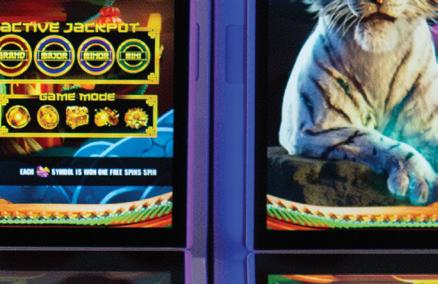






Jin Qián Link game mechanics and mathematics merge with its three features to provide generous payouts and gaming




sessions that engage and retain players. Luck Has Arrived is the common feature of the pack, which includes Triple Wild as the game feature for Golden Lóng and Lucky Guī, and Wild Multiplier as the game feature for Great Weiyan and Eternal Niáo Wang.
Nowadays, Jin Qián Link is enchanting players in over 60 Mexican casinos and keeps expanding. In the future, FBM plans to take the mystical creatures and golden wealth of this slot adventure to markets in Asia, America, and Europe under the same name or exploring other options connected to the Asian roots.




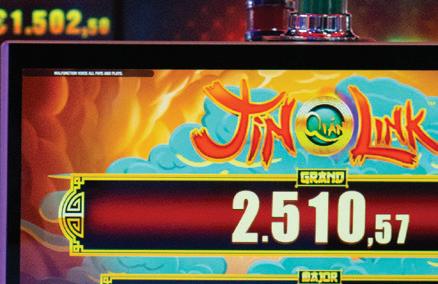

Once again, Gambling Insider takes a close look at some of the exciting products now available on the casino oor
Inspired Entertainment, has revealed its latest slot game, Party Time. This game brings the original arcade experience to B3 players, with party hats, balloons and presents all found in the game. Players should ready themselves for a fun-filled gaming experience as an exciting Wild and Party Time feature await, capturing the classic arcadestyle atmosphere they know.

To get the party started, players will need to land three party hats. Three party hats can either grant players the opportunity to choose one or two reels to turn wild or award the coveted Party Time Feature – with the Party Time Feature, an extra Party reel set emerges above the existing reels, guaranteeing players extra wins. The reels will continue to spin, awarding exciting rewards with each turn until the feature completes.
If the player chooses to gamble their win, they will encounter two wheels. The right wheel offers the chance to wager current winnings for the exciting Party Time Bonus, while the left wheel provides a chance to increase winnings.
Richard Terry, UK Product Director, said of


Party Time: “Party Time has become an iconic brand in its own right on the UK high street since its groundbreaking original release in 1998. Our design teams have preserved all of the original


elements that made Party Time so popular while simultaneously innovating for the 21st century market with the exciting addition of the gambleto-feature function.”

The exciting set of five Linked Progressive titles in the XTENSION LINK™ Volume 1 combined with excellence in cabinet design as well as Novomatic’s circular signage package creates an exceptional hardware and software offer.




Each title in the XTENSION LINK™ comes with a distinct Expanding Reels Feature and the Golden Spins for maximum Progressive wins. The dynamic reel layout of this set of games expands in reaction to individual symbol-driven game events, activating extra reel positions or rows, respectively for the current spin, and thus increasing win lines and chances for the Golden Spins Progressive feature.



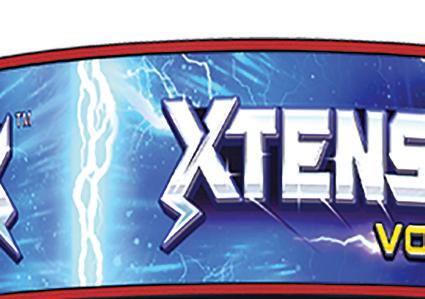
Spins for maximum Progressive wins. The dynamic
The magical Snow Kingdom™ features 2-stack-






















The magical Snow Kingdom™ features 2-stackPrincess symbols that activate one extra row on the reels for the current spin. The fruit-style game Dazzling Stars™ comes with a special Stars Feature: Various colours of Star symbols in the active reel area activate one, two or three extra rows on the reels for the current spin.
Various colours of Star symbols in the active reel on the respective reel for the current spin. The Asian
The ALLPAY title Flames of Glory™ is set in Ancient Rome, featuring special Scatter symbols that may appear in the inactive reel area and open up to five positions on the respective reel for the current spin. The Asian ALLPAY® theme Red Dream™ surprises players with random reel expands in the base game and the free games. Finally, the fruit game Stars Up™ features Stars in the active reel area that each activate three extra rows on the reels for the current spin.

Presented in the elegant DIAMOND X™ 1.55J cabinet, this stunning Linked Progressive game-mix has quickly become a favourite with operators and players alike, with clear above-floor-average and in many cases top-floor performance in many casinos across different markets.









players alike, with clear above-floor-average and in

ADVANTECHINNOCORE GIVING CUSTOMERS MORE OPTIONS WITH NEW AMD AND INTELBASED SOLUTIONS LAUNCHING AT G2E 2023.
Advantech-Innocore’s portfolio of gaming hardware and software solutions, peripherals and displays are on show at G2E, Booth #3230. Continuing their support and commitment to the industry and customers, the theme ‘All things gaming’ is aimed at addressing the requirements of the industry for flexible products, offering customers off-the-shelf solutions and/or customs builds that meet their requirements to bring their content to market.
Two of the main new products announced at G2E are the DPX-M266 and the DPX-S455 which expanded the popular DPX® product line of platform solution.


The DPX-M266 expands the DPX-M Series of gaming platforms, that focuses on multimedia
engines optimized for gaming OEMs through their modular expansion architecture. It is a versatile solution that uses the AMD Ryzen™ Embedded R2000 processor to deliver improved performance and functionality.
The platform’s scalability is achieved through a module expansion slot that can be used for specific applications or features developed in collaboration with Advantech-Innocore’s engineering team or integrated into the system by the customer directly. Great multimedia performance makes the DPX-M266 an ideal platform for customers who already have their own IO/security hardware or who do not need the full feature set of IO, COMs, security, and intrusion that Advantech-Innocore offers on gaming platforms. Propriety IO cards or customer specific hardware can be integrated with the platform via the side expansion bus to form a robust logic platform. Flexibility is the key


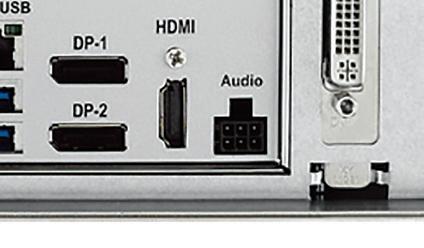
to the M-Series, meaning that customers who just need a reduced feature set can be provided with a simple IO module to provide exactly what they.














The DPX-S455, is the 13th generation of the GLI compliant all in one gaming, highperformance motherboard. This generation powered by Intel® hybrid core technology up to Core i9 and expanded the family of DPX-S Series products. This premium hardware is powered by Intel 12th and 13th Generation processors, offering high performance and proficiency to the regulated gaming market.
The DPX-S455 utilizes Intel technology to provide enhanced graphics, with hardware acceleration, and Intel Xe Architecture, along with real-time capabilities for smooth operation and function.


Development of Advantech-Innocore products is based with the customer in mind. Customers need to be able to respond to demands and movements of the market, without having to worry about compatibility issues or redevelopment of products. All DPX products are backward and forward compatible with products within their range and are backed by the reliability, longevity, and support that Advantech-Innocore is known for. DPX products also come with full sets of dedicated I/O, COMs, and security features designed specifically for the casino gaming market regulations.
High performance, scalability, and time to market for content development, are nonnegotiable, Advantech-Innocore’s winning strategy is to provide a proven and reliable set of support software alongside the hardware to give customers a dependable computing platform for the long term, allowing them to focus on their game content.
"HIGH PERFORMANCE, SCALABILITY, AND TIME TO MARKET FOR CONTENT DEVELOPMENT"











Interblock’s commitment to innovation has been, and will remain, a key success factor within the gaming industry. With over three decades of industry experience, Interblock’s reputation is anchored on delivering revolutionary gaming solutions, resulting in the creation of the Smart Pit.
Awarded “Table Game of the Year” by Global Gaming Awards Asia Pacific 2023, Interblock’s Smart Pit is a blend of traditional table games and futuristic technology. Seamlessly integrating a “Technology Umbrella” into existing live pits, this innovation redefines the gaming experience, empowering more decisions per hour, enhancing the house advantage across all product offerings and creating an increased level of customer service that has not been historically possible.
The Smart Pit is designed to attract existing and new players alike, while enhancing efficiency,

security and overall performance across a wide range of table games, including Roulette, Craps, Blackjack and Baccarat. By eliminating timeconsuming transactions, the Smart Pit empowers dealers to operate games effortlessly, ensuring 100% accurate payouts.
The Smart Pit’s technology umbrella enables real-time player session valuations, eliminating the need for manual data entry. Incorporating advanced game protection, the Smart Pit is able to address the industry’s annual multimilliondollar losses due to dealer mistakes through automated card, wheel and chip reconciliation utilising Interblock’s live hybrid games, ensuring heightened security and error-free gameplay.
The Smart Pit interconnects the live table games within a traditional table game pit, allowing players to engage in multiple games simultaneously, boosting player engagement and casino revenue. A player seated at Smart Pit’s Blackjack table can concurrently play the Roulette game at the opposite end of the pit,




while utilising the same wallet. For dealers, it simplifies tasks and emphasizes customer service, resulting in greater efficiency and more decisions per hour. To further ensure the acceptance of existing dealers within the live table game environment, the Smart Pit offers multiple forms of tipping, creating a greater level of customer service and acceptance.
Operators benefit from optimised staffing levels, heightened profitability and an improved gaming environment. Moreover, the Smart Pit attracts a newer player demographic, addressing the intimidation often felt with traditional tables, as evidenced by recent high carded play and occupancy ratios, further enhancing the casino’s bottom line.
Showcasing at G2E 2023 in Booth #1239, the Smart Pit offers a level of technology never seen before within the gaming sector, enabling casinos to attract both existing and new players alike, while driving incremental profit to their bottom line.
"OPERATORS BENEFIT FROM OPTIMISED STAFFING LEVELS, HEIGHTENED PROFITABILITY AND AN IMPROVED GAMING ENVIRONMENT"
"THE SMART PIT’S TECHNOLOGY UMBRELLA ENABLES REALTIME PLAYER SESSION VALUATIONS, ELIMINATING THE NEED FOR MANUAL DATA ENTRY"






















AAardvark Technologies www.adv.bet

T: +370 640 50001
E: sales@adv.bet
Aruze Gaming www.aruzegaming.com
T: +1 70 2361 3166
E: sales@aruze-gaming.com

CContinent 8 www.continent8.com
T: +44 16 2467 8888
E: sales@continent8.com

DDigitain LLC www.digitain.com


T: +3 74 6070 0400
E: info@digitain.com
BBBIN www.bb-in.com

E: service@mail.bb-in.com
bet365 www.bet365.com

T: +44 80 0028 8365
E: support-eng@customerservices365.com

Betradar www.betradar.com
T: +41 7 1517 7200
E: sales@betradar.com
BtoBet www.btobet.com
E: sales@btobet.com
BetConstruct www.betconstruct.com

T: +44 20 3709 9010
E: sales@betconstruct.com

EEveryMatrix www.everymatrix.com


T: +40 3 7104 2222
E: info@everymatrix.com
Evolution www.evolution.com
E: asrealasitgets@evolution.com
Evoplay evoplay.games
E: business@evoplay.games

Exacta Solutions www.exactasolutions.com

T: +356 2134 4249
E: info@exactasolutions.com
FastTrack

T: +44 113 320 2245
E: letsgo@fasttrack-solutions.com
Interblock www.interblockgaming.com
E: info@interblockgaming.com
KKambi www.kambi.com
T: +356 21315514
E: sales@kambi.com


GGaming Arts www.gamingarts.com

T: +1 702 818 8943
Global Payments Gaming Solutions www.globalpaymentsgaming.com

T: 702-822-7000
E: tiona.petty@globalpay.com

Greentube www.greentube.com
T: +43 1 90 171
E: o ce@greentube.com
LLeoVegas A liates leovegasa liates.com

T: +356 27780258
E: a liate@leovegas.com
MMERKUR GAMING www.merkur-gaming.com


T: +49 5741 2736 9301
E: sales@merkur-gaming.com
HHabanero www.habanerosystems.com
E: sales@habanerosystems.com
NNeosurf www.business.neosurf.com

T: +44 1483 3630 91
E: sales@neosurf.com
IIGT www.igt.com
T: + 1 702 669 7777
E: info@igt.com

NOVOMATIC www.novomatic.com
T: +43 2252 606 0
E: communications@novomatic.com

PPariplay www.pariplayltd.com


T: +3 56 2756 3725
E: info@pariplayltd.com
Pragmatic Play www.pragmaticplay.com
E: sales@pragmaticplay.com
RRaven Track www.raventrack.com

T: 07799 898 175
E: adam@raventrack.com
Relax Gaming www.relax-gaming.com

E: sales@relax-gaming.com
SSuzo Happ www.na.suzohapp.com
T: 888-289-4277
E: sales@suzohapp.com


Soft2Bet www.soft2bet.com
E: office@soft2bet.com
TTrustly Group AB www.trustly.com

E: sales@trustly.com


VVallettaPay www.vallettapay.com
T: +44 151 947 0483
E: info@vallettapay.com

WWorld Match www.worldmatch.eu
T: +39 049 785 1905
E: sales@worldmatch.eu

YYggdrasil Gaming www.yggdrasilgaming.com

E: sales@yggdrasilgaming.com
ZZitro www.zitrogames.com

T: +352 266 33
E: info@zitrogames.com

How do table games need to adapt or evolve to maintain their allure in the face of online offerings? This is a pertinent question that Interblock and others in the industry address, particularly in the dynamic world of gaming where table games hold a special place close to players’ hearts. Games like blackjack, roulette, craps and baccarat have been captivating players for generations, long before the arrival of online gaming platforms. However, as the digital realm continues to expand and revolutionise the way we experience entertainment, the need for these classic games to evolve becomes even more pressing.
At Interblock, we understand that the allure of table games lies in the ambiance, human interaction and tactile sensations they offer, setting them apart from the digital realm. Table games provide a unique experience that online gaming can’t entirely replicate. It’s a multisensory delight – the sensation of chips, the visual spectacle of the spinning roulette wheel, the interaction between dealer and player, and the collective thrill of a winning moment. These elements form the essence of table games and differentiate them from their online counterparts. Nevertheless, as the online realm offers unmatched convenience, variety and personalisation, table games need to recalibrate their strategies to ensure they remain relevant and enticing.









As the gaming landscape evolves, we recognise the need to bridge the experience gap between







physical and online games. Our approach is not to imitate online games, but to enhance the table game experience to incorporate elements that modern players, who frequent online platforms, have grown accustomed to. The answer lies in capturing the essence of both worlds, giving players a feeling of familiarity paired with the thrill of the tangible experience. This offers a gaming experience that is both authentic and exciting, capturing the essence of both traditional and modern gaming.


It’s undeniable that the integration of technology can vastly improve the player journey. This includes enhanced game tracking, player metrics, or even facilitating smoother, more efficient gameplay. Seamlessly integrated into live pits, innovative technology empowers dealers with more decisions per hour, increases betting opportunities and enhances house advantage. This integration of technology elevates the tactile feel of the game while ensuring that gameplay remains intuitive and player centric.
One notable advantage that online platforms boast is the vast variety they offer. At Interblock, we recognise the importance of diversification and believe that land-based casinos should introduce a more varied array of game variants. Variety is pivotal in keeping players engaged. Games can either stand alone or integrate into larger gaming arenas, offering players a unique and immersive experience that combines
traditional rules with modern twists, all while staying anchored to the core spirit of table gaming.


Online platforms often have communities, forums and engagement tools that keep players connected. We see the potential in physical table games harnessing the power of community, we believe in creating an environment where players feel connected and part of something bigger. By bringing players together in an interactive and social gaming space, we can create an ambiance that goes beyond the game itself, encouraging a sense of belonging and shared experiences.



The online space thrives on instant feedback. Interblock champions a similar approach for table games, continuously evolving based on player data, thereby ensuring games remain in tune with what players genuinely want. We strive to drive the innovation of tomorrow’s table gaming experiences using player data.
In closing, our vision for the future of table games is one of harmony and synergy with the digital world. Rather than competing, we aim to enhance and elevate the unique appeal of table games. By embracing innovation, adapting to the changing landscape and staying true to our commitment to the player experience, we are confident that table games will continue to thrive in this era of technological advancement.
Interblock Global CEO John Connelly highlights the evolution of table games in the digital age and how this requires adaptation to remain relevant in the modern world











